Szeretettel Hollywoodból
Manila Bulletin
“I have literally not taken off this jacket in weeks,” the 28-year-old Robert Pattinson told us when we interviewed him for his latest movie, “The Rover.”
Wearing a simple blue jacket, shirt and pants, the “Twilight” superstar explained that somebody stole his clothes. “It doesn’t make any sense to me,” he said. “Did you ever see that episode of ‘South Park’ about these underpants gnomes that steal your underpants? I think I got it. So I just started wearing the same thing pretty much every day, like a uniform.”
He admitted that he has no idea where his clothes are. “I’m sure they’re in some kind of random storage box somewhere… I know that is totally ridiculous but I couldn’t find any of them.”
Since he has been making movies in diverse locations since “Twilight,” the British actor revealed that he calls LA home – at least, for now.
Curiously, however, Robert informed us that he sold his house in LA “I suddenly realized I am not quite old enough to be dealing with the plumbing and stuff.”
We asked him if he’s homeless and he said, “I am not quite. I spend about six months borrowing other people’s houses, which were nice.”
It’s been two years after all the insanity and craziness of “Twilight” and Robert shared, “It feels like it’s longer, to be honest… it’s all just been a gradual progression. I think, as you get older, like every movie you do you get a little bit more confident…”
He added, “I’m curious how people receive the new stuff I’m doing because it’s kind of, you know, I do quite abstract films. So I am curious how people who like ‘Twilight’ will come to see things like ‘The Rover.’ Hopefully, they’ll enjoy it.”
Asked whether it became a nice escape for him to be filming “Rover” in Australia without “Twilight” fans wandering around, Robert replied, “It was definitely a really nice escape… I loved it because not only were there no people trying to find you, there’s no one at all. So it’s just much easier to concentrate. So I found it incredibly peaceful and relaxing.”
Robert is also appearing in “Maps To The Stars.” He explained his role in the said movie, “My role (in it) is a kind of cipher for Bruce Wagner who wrote it and because he used to be a limo driver in LA. He wrote a lot of stuff and got many of his ideas from that so he is the one vaguely normal person in ‘Maps to the Stars’ but he’s kind of a little bit opportunistic. He is a wannabe actor and writer but probably not that talented. He’s like a hustler in LA.”
On choosing roles, Robert said, “50 percent is about being able to work with directors I admire. I think about that a lot but I find it more comfortable to do small roles if I am choosing something for its director. But if you are doing a lead, I try to do something, which I think will precipitate into my normal life.
“I want to do something which I feel (is) totally impossible for me to do. I think it will make me a bigger person in my real life afterwards. I kind of try to do that.”
Wearing a simple blue jacket, shirt and pants, the “Twilight” superstar explained that somebody stole his clothes. “It doesn’t make any sense to me,” he said. “Did you ever see that episode of ‘South Park’ about these underpants gnomes that steal your underpants? I think I got it. So I just started wearing the same thing pretty much every day, like a uniform.”
He admitted that he has no idea where his clothes are. “I’m sure they’re in some kind of random storage box somewhere… I know that is totally ridiculous but I couldn’t find any of them.”
Since he has been making movies in diverse locations since “Twilight,” the British actor revealed that he calls LA home – at least, for now.
Curiously, however, Robert informed us that he sold his house in LA “I suddenly realized I am not quite old enough to be dealing with the plumbing and stuff.”
We asked him if he’s homeless and he said, “I am not quite. I spend about six months borrowing other people’s houses, which were nice.”
It’s been two years after all the insanity and craziness of “Twilight” and Robert shared, “It feels like it’s longer, to be honest… it’s all just been a gradual progression. I think, as you get older, like every movie you do you get a little bit more confident…”
He added, “I’m curious how people receive the new stuff I’m doing because it’s kind of, you know, I do quite abstract films. So I am curious how people who like ‘Twilight’ will come to see things like ‘The Rover.’ Hopefully, they’ll enjoy it.”
Asked whether it became a nice escape for him to be filming “Rover” in Australia without “Twilight” fans wandering around, Robert replied, “It was definitely a really nice escape… I loved it because not only were there no people trying to find you, there’s no one at all. So it’s just much easier to concentrate. So I found it incredibly peaceful and relaxing.”
Robert is also appearing in “Maps To The Stars.” He explained his role in the said movie, “My role (in it) is a kind of cipher for Bruce Wagner who wrote it and because he used to be a limo driver in LA. He wrote a lot of stuff and got many of his ideas from that so he is the one vaguely normal person in ‘Maps to the Stars’ but he’s kind of a little bit opportunistic. He is a wannabe actor and writer but probably not that talented. He’s like a hustler in LA.”
On choosing roles, Robert said, “50 percent is about being able to work with directors I admire. I think about that a lot but I find it more comfortable to do small roles if I am choosing something for its director. But if you are doing a lead, I try to do something, which I think will precipitate into my normal life.
“I want to do something which I feel (is) totally impossible for me to do. I think it will make me a bigger person in my real life afterwards. I kind of try to do that.”
Cosas and Express
From Cosas.com
- What have you learned since the end of the saga "Twilight"?
- It feels like it’s longer, to be honest… it’s all just been a gradual progression. I think, as you get older, like every movie you do you get a little bit more confident… (Manila Bulletin)
- And how can you face the madness of the public against your person?
- I’m curious how people receive the new stuff I’m doing because it’s kind of, you know, I do quite abstract films. So I am curious how people who like ‘Twilight’ will come to see things like ‘The Rover.’ Hopefully, they’ll enjoy it.(Manila Bulletin)
- Why did you choose a genre so different?
- 50 percent is about being able to work with directors I admire. I think about that a lot but I find it more comfortable to do small roles if I am choosing something for its director. But if you are doing a lead, I try to do something, which I think will precipitate into my normal life. I want to do something which I feel (is) totally impossible for me to do. I think it will make me a bigger person in my real life afterwards. I kind of try to do that. (Manila Bulletin)
- Where do you live now?
- I spent two months in England last year which is the longest I’ve spent there in six years, which was nice, but I always go back to England at Christmas time and get so depressed that I’m glad to get back to Los Angeles. I’ve really grown to like L.A and I guess it’s my home at the moment. (Telegraph)
- You're not living in your mansion?
- I sold it, and then I realized that I had become homeless (laughs). For 6 months, I have lived in the homes of friends that I go with my three air mattresses. I sold my house, because I'm too young to be dealing with plumbing problems and stuff like that (laughs). I could live in a cell if it had a window. (Google translate)
-I read that you were very nervous when I auditioned for "The Rover". How do you handle anxiety?
- I would love to go into therapy but it makes me too anxious. I have talked to a lot of people about it. I like my anxiety in a funny way. I like my peaks and troughs. I used to get such crippling anxiety before auditions that, every time I did, I’d want to quit acting after. So it would be physically painful. The audition process was so long. It was like a four-hour audition. For the first 45 minutes of walking into almost any room, I had to deal with my own neuroses before I could do any kind of acting. I think David recognized that. If you let yourself calm down, then you’re fine afterward. (The Philippine Daily)
-After filming such a dark and apocalyptic as "The Rover" movie, do you plan to have children one day?
- I believe that humanity remains the same, generation after generation. And all those who predict that the world is ending, have not been right. I think that man is basically good, and I wouldn't have problems in having children, but maybe I'm answering my ignorance as well. I live a very simple life swimming in my pool all day (more laughter). (Google translate - another answer to that question slightly different here)
- Are you really not afraid of global warming and its consequences?
-I have a blind faith in humanity and I think people won't change. It's very difficult to accept that during my generation our species will become extinct. I think in the end, most will see the light and have a happy ending. People don't like good news, bad prefer that sell more newspapers. Predicting the end don't produce results; however, if you hope, maybe we can achieve something. (Google translate)
-When you choose a movie, what you want in the story?
- I don’t really [regard] it from the perspective of the stories; it’s really more of the character stuff. I never really look at a script as a whole. I’m doing this movie (‘Idol’s Eye’) with Olivier Assayas at the end of the year. It’s a big ensemble thing. But I know exactly what my character’s about. There is something specific about it. It’s new, especially in a gangster movie. It’s an interesting take on a criminal’s psychology. (The Philippine Daily)
- How did it feel filming "The Rover" in Australia?
- I liked Australia. I had only been to Sydney just to do press before. Working in the Outback was a totally different world, but I loved it out there. It was beautiful, kind of serene being able to see the horizon. There’s just absolutely nothing for miles, hundreds of miles. (Star Online)
- What did you like best?
- Not only were there no people trying to find you, there was no one there at all so it was much easier to concentrate on your performance and not have to worry about someone trying to sneak up on you. I found it incredibly peaceful and relaxing. (Star Online)
- What is the worst thing that happened to you with the paparazzi?
-Once, I was followed by about eight cars for ten hours, not knowing what to do. They wanted to know where I lived, and I tried to mislead them. (Google translate)
- How do you deal with fame?
- From the beginning I have dissociated from it. Just see it as part of the job. Some years ago, I had a bit of a struggle because my life really contracted and I couldn’t do a lot of the stuff I used to be able to do, but once I got through that a year or two ago I just accepted my life is something else and now I can’t really remember what it was like before, So it’s much easier to deal with. (Google translate and Telegraph)
- What are the advantages?
- Meeting people—it’s so crazy sometimes. I was in London recently and in some place, David Beckham walked through. He was like, ‘Hey, man!’ It was so crazy. I am still like a little child in terms of that. (The Philippine Daily)
- Did you always want to act?
- I wasn't a child actor or anything. I didn't have drama classes at school. When I turned 15 I joined a drama club, because of a girl I liked. I worked as a scriptwriter, I never had intentions to act. They staged the play "Guys and Dolls" and then I had a mad desire to embody the character Nathan Detroit, I became obsessed. I didn't get the role, but I ended up playing a Cuban dancer. Then in the play "Our Town" by Thorton Wilder, I was given the lead role; there was an agent in the audience who asked me to represent me. Then I did "Vanity Fair" with Reese Witherspoon and after "Harry Potter and the Goblet of Fire" where I played Cedric Diggory. (Google translate)
- What kind of movies do you like?
- I've been a movie buff since my teens, and even before. When I choose scripts, I don't care that my part is small, as when I worked ten days with Werner Herzog. But to distract myself I look at everything. (Google translate)
- How you glimpse your future career?
- I don't know. I was never guided by what the public wants or what the critics say; you can't please everyone. What makes me happiest is to work with people that have a passion for their films like Werner Herzog or David Cronenberg, or Michod. Since I was 16 I've been wanting to work with Herzog. I want to continue doing ambitious projects that excite me, although I don't know if the public will share my interests. I'm not interested in becoming "a Hollywood star." (Google translate)
- What do you think of David Cronenberg?
- When I went in "Cosmopolis" something changed in my mind and I knew that would make any movie with him in the future, without even reading the script. I like how he faces his movies and life, he's a very wise person. I am happy to have worked with David on "Maps to the Stars" (Google translate)
- Can you describe your role? - My role (in it) is a kind of cipher for Bruce Wagner who wrote it and because he used to be a limo driver in LA. He wrote a lot of stuff and got many of his ideas from that so he is the one vaguely normal person in ‘Maps to the Stars’ but he’s kind of a little bit opportunistic. He is a wannabe actor and writer but probably not that talented. He’s like a hustler in LA. (Manila Bulletin)
- Will you be the new Indiana Jones?
- I [notice that] every few months, someone comes up with a story specifically with the intention of having 50 bad replies on Twitter. All these people saying, ‘Robert is ruining my dreams’ (laughing). I didn’t even know they were rebooting ‘Indiana Jones’ until someone asked me about it. (The Philippine Daily)
- Do you consider yourself a happy and lucky man?
I am extremely lucky, which always makes me a little bit nervous, I don’t quite know why I got so lucky. It’s just ridiculous. I’m pretty happy. (The Philippine Daily)
-If this was the last day of your life, what would you do?
I might like to just walk around the Times Square naked or something (laughs). (The Philippine Daily)
Where do you live now?
I was homeless for six months after the sale (of his house). I borrowed houses from people when they were not in the city. Now I've found a home in the Hollywood Hills that I rent. It's not too big. I barely have furniture. Some of them are from the previous tenant. The only thing I brought with me, are air mattresses. In which I sleep.
You have earned millions and can afford expensive equipment.
I'm not materialistic. The only thing I treat myself, are old guitars. I have 17 in my collection. My showpiece is a 1943 Gibson J100 acoustic guitar. I don't care about other things such as designer clothes. However, I should go out to buy clothes.
Why?
I can not find most of them. That's why I wear the jacket I'm wearing, continuously for the past two weeks. My stuff should be in a box in a rental warehouse in Los Angeles or in my London apartment. I rather think the latter. I've just seen pictures of my old roommate Tom Sturridge, running around in my pants and shirt ... (laughs).
Philippine Daily (w/ New Photo)
LOS ANGELES—“Don’t hate me ’cause I’m beautiful/ Don’t hate me ’cause I’m beautiful/ Now do the pretty girl rock, rock, rock.” Robert Pattinson singing along to Keri Hilson’s “Pretty Girl Rock” playing on the radio in his car, before a violent moment, is a rare humorous relief in David Michod’s “The Rover.” It prompted a question in a recent interview at LA’s Four Seasons on whether Robert plans to record an album anytime soon.
“I’m always trying to figure out how… but it’s quite difficult,”replied the actor, looking boyish with his short haircut, dark pants, black jacket over a brown shirt and white tee. Laughing, the 28-year-old Robert said, “I want to do it before I’m 30 because I think it gets slightly embarrassing after [that].”
Robert revealed that, originally, he was to sing along to The Pussycat Dolls’ “Don’t Cha.” (That would have been a hoot, too.)“But David e-mailed me that Keri Hilson song,” he said. “I thought it was a new song. I didn’t realize it had like 500 million (actually 48 million plus) views on YouTube.”
He explained, “Initially, David was saying that he wanted me to sing it like it was my favorite song—loudly in the car. Luckily, it didn’t end up that way. That would have been a bit too random. But the song is perfect in the movie.”
In “The Rover’s” post-apocalyptic world set in Australia’s Outback, Robert’s Rey and Guy Pearce’s Eric make an unlikely pair hunting for a stolen car. “It’s strange because people are interpreting the movie as being really bleak,” countered the London native. “But [I’m playing a] character who has no memory of what happened before. He’s relatively at ease. It was a really fun part. I wasn’t thinking about it [as] bleak.”
“I’m always trying to figure out how… but it’s quite difficult,”replied the actor, looking boyish with his short haircut, dark pants, black jacket over a brown shirt and white tee. Laughing, the 28-year-old Robert said, “I want to do it before I’m 30 because I think it gets slightly embarrassing after [that].”
Robert revealed that, originally, he was to sing along to The Pussycat Dolls’ “Don’t Cha.” (That would have been a hoot, too.)“But David e-mailed me that Keri Hilson song,” he said. “I thought it was a new song. I didn’t realize it had like 500 million (actually 48 million plus) views on YouTube.”
He explained, “Initially, David was saying that he wanted me to sing it like it was my favorite song—loudly in the car. Luckily, it didn’t end up that way. That would have been a bit too random. But the song is perfect in the movie.”
In “The Rover’s” post-apocalyptic world set in Australia’s Outback, Robert’s Rey and Guy Pearce’s Eric make an unlikely pair hunting for a stolen car. “It’s strange because people are interpreting the movie as being really bleak,” countered the London native. “But [I’m playing a] character who has no memory of what happened before. He’s relatively at ease. It was a really fun part. I wasn’t thinking about it [as] bleak.”
In that context, Robert expressed an optimistic view of humankind despite the film’s desolate, barren landscape that doesn’t seem to offer any hope. “I think humanity [stays] pretty much the same, generation after generation,” the erstwhile “Twilight” star declared. “Everybody thinks the world is going to sh*t all the time.”
Laughing again, Robert stressed, “It ends up being all right. I think that, essentially, humans are pretty good.”
With his character seemingly in danger of being killed any minute, Robert was asked what he would do if he had only a day to live. “I guess I should say, ‘I would hang out with all the people I love.’ But probably, I [would] just want to go crazy.”
Like, do what crazy stuff? “God, I don’t know,” he said with a grin. “I might like to just walk around the Times Square naked or something.”
Dealing with anxiety
Wouldn’t he be scared to have kids if the future was as grim as presented in the crime-drama? “I will definitely bring kids [into the world] or maybe I’m just ignorant,” he answered. “I do live a very specific kind of life.” Chuckling yet again, he quipped, “I can just stay in my swimming pool all day.”
Asked how he deals with anxiety, Robert’s reply was still humorous: “I would love to go into therapy but it makes me too anxious.”
He elaborated, turning just a bit serious: “I have talked to a lot of people about it. I like my anxiety in a funny way. I like my peaks and troughs. I used to get such crippling anxiety before auditions that, every time I did, I’d want to quit acting after. So it would be physically painful.
“The audition process (for this movie) was so long. It was like a four-hour audition. For the first 45 minutes of walking into almost any room, I had to deal with my own neuroses before I could do any kind of acting. I think David recognized that. If you let yourself calm down, then you’re fine afterward.”
Discussing his bouts with depression, Robert shifted back to a laughing mode as he cracked, “I have to wallow in it. Luckily, it never lasts that long. That’s the good thing about being manic.”
He squashed the buzz that he’s going to be the next Indiana Jones. “I [notice that] every few months, someone comes up with a story specifically with the intention of having 50 bad replies on Twitter. All these people saying, ‘Robert is ruining my dreams’ (laughing). I didn’t even know they were rebooting ‘Indiana Jones’ until someone asked me about it.”
He continued: “I’m always a bit wary of stepping into the shoes of an already established character. It’s scary, especially because you’re already fighting so many expectations before you even start doing the job. That’s the thing with franchises. You have to commit 100 percent. If you’re in a five-movie series, you can get so down afterward.”
With “Twilight,” he said, after reading the first three books, “I had an idea of what I wanted to do. I had never experienced being in a series. It’s a massive undertaking. It’s nothing like doing an indie for two months. It’s completely different.”
He stressed that he “looks at everything,” including potential franchise projects. “I wouldn’t have any problems playing a vampire again,” he said.
“I’ve never really been one of those actors who are thought of for superhero parts,” he volunteered. “I’m open to absolutely everything. Most of the jobs I do, I never saw them coming. Like with ‘The Rover,’ I was not at all like, ‘Oh, I want to play this specific character.”
Maybe comedy
The actor, who also top-bills David Cronenberg’s “Maps to the Stars,” explained what he looks for in scripts that come his way. “I don’t really [regard] it from the perspective of the stories; it’s really more of the character stuff. I never really look at a script as a whole. I’m doing this movie (‘Idol’s Eye’) with Olivier Assayas at the end of the year. It’s a big ensemble thing. But I know exactly what my character’s about. There is something specific about it. It’s new, especially in a gangster movie. It’s an interesting take on a criminal’s psychology.”
He never considers projects in terms of genre. “But I’d like to do a comedy at some point. But it’s that vague—I’m not really seeking stuff out.” He’d be perfect in a comedy, based on the humor and charm he exhibits at interviews.
This Brit, who admitted that he’s grown to really like LA, said with a chuckle again, “Most of the directors I’m working with are basically people I loved when I was 17. I still watch the same movies but I also watch a ton of stuff that’s for work, or for enjoyment. I watched ‘Last Vegas’ the other day. I thought it was amazing. I was crying my eyes out. ‘The Lego Movie’ is my favorite movie of the year.”
On the fun perks of fame, Robert remarked, “Meeting people—it’s so crazy sometimes. I was in London recently and in some place, David Beckham walked through. He was like, ‘Hey, man!’ It was so crazy. I am still like a little child in terms of that.”
He fully knows how blessed he has been. “I am extremely lucky, which always makes me a little bit nervous,” he commented. “I don’t quite know why I got so lucky. It’s just ridiculous. I’m pretty happy.”
His name is Rey and he does not look, talk or act like anybody’s idea of a teen heartthrob.
His teeth are crooked and foul. His hair is a bad bowl-buzzcut. He’s dirty from head to toe, and when he manages to speak, he mumbles disjointed sentences, often repeating them for no good reason.
He certainly bears little resemblance to the world’s most handsome vampire, the perfectly coiffed, sparkly skinned Edward Cullen, hero of the “Twilight” franchise. And yet Rey, the train-wreck at the center of the post-apocalyptic manhunt “The Rover,” is indeed played by the usually dashing Robert Pattinson.
“I generally don’t get picked for these parts,” Pattinson admits on the phone from L.A. “There’s about five actors who seem to have a lock on the weirdos. I’ve never really been perceived to be one of them — up until now maybe.”
How badly did Pattinson want the part? He auditioned for it. Twice.
Understand, this is a guy whose last movie, “Breaking Dawn — Part 2,” earned $829 million worldwide.
But he understood the need for an audition.
“Well, it’s very different from who I am, personally. There’s no way of really proving that I could have done it by just talking about it,”he says. “It would have been a giant leap of faith.”
Pattinson, 28, saw the jittery, perpetually insecure Rey as a literal underdog.
“In a pack of dogs there’s always one who will completely accept the beta position,” he says.
To help him find the right mindset, director David Michod had Pattinson watch the documentary “Bully,” which follows the lives of kids who are constantly picked on. The actor understood right away.
“People have been accusing you of having something wrong with you for so long that you believe it,” he says. “No one’s expecting anything from you, you stop thinking, you’re a dependent. You don’t have any choice. Really, the only thing he feels is fear of everything.”
It helped that co-star Guy Pearce happens to be a fairly imposing presence.
“Guy’s just got this constant pressure on you in a scene. And he’s got such a singular focus that you kind of end up just falling to pieces,” Pattinson says. “It’s like you’ve got a laser beam on you.”
Pattinson certainly has experience with bright lights. Born and raised in London, he started working in amateur theater at age 15. An agent spotted him there and by 2005 he had landed a small part in “Harry Potter and the Goblet of Fire.”
By 2008 he’d been chosen to play Edward Cullen in the “Twilight” series. Five movies and countless magazine and tabloid covers later, the franchise concluded last year with “Breaking Dawn — Part 2,” having earned more than $3.3 billion.
Pattinson has learned to adapt to the spotlight over the years, and he even ventures out into public on occasion these days.
“You sort of weigh up what you want your day to be. If you say my friends are going to a movie or whatever and if you go you’re probably going to get a bunch of photographs taken of you,” he says.“Sometimes you’re cool with it, other times I don’t want to be bothered to deal with the stress of it. But I’ve definitely figured out a more balanced way to live than four years ago.”
Along with celebrity, “Twilight” brought Pattinson high visibility within the film world, and he’s been working with some of the most respected people around. He did “Cosmopolis” with director David Cronenberg in 2012 and stars in Cronenberg’s upcoming “Maps to the Stars.” He’s playing T.E. Lawrence in director Werner Herzog’s “Queen of the Desert,” alongside Nicole Kidman and James Franco, and has “Idol’s Eye,” with Robert De Niro and Rachel Weisz, coming up.
Pattinson says “Twilight” probably gave him a boost with his peers, but he’s not sure how much of one. “Within the industry, lots of people I work with, none of them have seen ‘Twilight’ — but then Werner Herzog loves ‘Twilight’!” he says. “I think it’s helped me out in a lot of ways. You have to kind of figure out how to ride the wave afterward.”
And he wants to keep riding that wave, chasing the acting high.
“I guess I was a relatively shy person when I was younger. I still am kind of. It’s nice to challenge yourself, especially in big emotional scenes with a part you’re not capable of doing. To be able to challenge yourself in that way, it’s quite exhilarating,” Pattinson says.
“Especially when it goes right,” he adds. “It could be the worst thing ever.”
His teeth are crooked and foul. His hair is a bad bowl-buzzcut. He’s dirty from head to toe, and when he manages to speak, he mumbles disjointed sentences, often repeating them for no good reason.
He certainly bears little resemblance to the world’s most handsome vampire, the perfectly coiffed, sparkly skinned Edward Cullen, hero of the “Twilight” franchise. And yet Rey, the train-wreck at the center of the post-apocalyptic manhunt “The Rover,” is indeed played by the usually dashing Robert Pattinson.
“I generally don’t get picked for these parts,” Pattinson admits on the phone from L.A. “There’s about five actors who seem to have a lock on the weirdos. I’ve never really been perceived to be one of them — up until now maybe.”
How badly did Pattinson want the part? He auditioned for it. Twice.
Understand, this is a guy whose last movie, “Breaking Dawn — Part 2,” earned $829 million worldwide.
But he understood the need for an audition.
“Well, it’s very different from who I am, personally. There’s no way of really proving that I could have done it by just talking about it,”he says. “It would have been a giant leap of faith.”
Pattinson, 28, saw the jittery, perpetually insecure Rey as a literal underdog.
“In a pack of dogs there’s always one who will completely accept the beta position,” he says.
To help him find the right mindset, director David Michod had Pattinson watch the documentary “Bully,” which follows the lives of kids who are constantly picked on. The actor understood right away.
“People have been accusing you of having something wrong with you for so long that you believe it,” he says. “No one’s expecting anything from you, you stop thinking, you’re a dependent. You don’t have any choice. Really, the only thing he feels is fear of everything.”
It helped that co-star Guy Pearce happens to be a fairly imposing presence.
“Guy’s just got this constant pressure on you in a scene. And he’s got such a singular focus that you kind of end up just falling to pieces,” Pattinson says. “It’s like you’ve got a laser beam on you.”
Pattinson certainly has experience with bright lights. Born and raised in London, he started working in amateur theater at age 15. An agent spotted him there and by 2005 he had landed a small part in “Harry Potter and the Goblet of Fire.”
By 2008 he’d been chosen to play Edward Cullen in the “Twilight” series. Five movies and countless magazine and tabloid covers later, the franchise concluded last year with “Breaking Dawn — Part 2,” having earned more than $3.3 billion.
Pattinson has learned to adapt to the spotlight over the years, and he even ventures out into public on occasion these days.
“You sort of weigh up what you want your day to be. If you say my friends are going to a movie or whatever and if you go you’re probably going to get a bunch of photographs taken of you,” he says.“Sometimes you’re cool with it, other times I don’t want to be bothered to deal with the stress of it. But I’ve definitely figured out a more balanced way to live than four years ago.”
Along with celebrity, “Twilight” brought Pattinson high visibility within the film world, and he’s been working with some of the most respected people around. He did “Cosmopolis” with director David Cronenberg in 2012 and stars in Cronenberg’s upcoming “Maps to the Stars.” He’s playing T.E. Lawrence in director Werner Herzog’s “Queen of the Desert,” alongside Nicole Kidman and James Franco, and has “Idol’s Eye,” with Robert De Niro and Rachel Weisz, coming up.
Pattinson says “Twilight” probably gave him a boost with his peers, but he’s not sure how much of one. “Within the industry, lots of people I work with, none of them have seen ‘Twilight’ — but then Werner Herzog loves ‘Twilight’!” he says. “I think it’s helped me out in a lot of ways. You have to kind of figure out how to ride the wave afterward.”
And he wants to keep riding that wave, chasing the acting high.
“I guess I was a relatively shy person when I was younger. I still am kind of. It’s nice to challenge yourself, especially in big emotional scenes with a part you’re not capable of doing. To be able to challenge yourself in that way, it’s quite exhilarating,” Pattinson says.
“Especially when it goes right,” he adds. “It could be the worst thing ever.”
Welcome back Robert Pattinson.
After the end of the Twilight saga, in which Pattinson played the beloved vampire Edward Cullen, the actor seemed lost.
What to do next?
His financial manager believed buying a US$6mil (RM19.4mil) mansion in Beverly Hills would be a wise investment. After all, he had all the money he could ever want ...
Meanwhile acting offers poured in, but the choices he made were none too wise. Then there was that split from the love of his life Kristen Stewart. How could she have cheated on him with her married director (Rupert Sanders who helmed Snow White And The Hunstman)!
But that was then.
Now, suddenly Pattinson’s career is in overdrive. He stars in two films that were the talk of the recent Cannes Film Festival: David Cronenberg’s corrosive Maps Of The Stars and David Michod’s dystopian The Rover.
But that’s the least of his life changes.
No longer cloistered in a four-bedroom mansion, Pattinson now lives a solitary life. He still keeps in touch with his Twilight co-stars, such as Kellan Lutz, with whom he loses money playing poker.
But he’s the first to concede: money doesn’t consume him.
No longer a homeowner, he now lives in a rental (but still in a posh gated community in Beverly Hills.). He sleeps on an inflatable mattress moving from room to room, no furniture to speak of. He’s mislaid much of his possessions including his wardrobe and his DVD collection.
At a recent press conference in Beverly Hills for The Rover, he’s as unassuming as he always was.
I remember once asking him about being fired on opening night at London‘s prestigious Royal Court Theatre.
Instead of showing mild embarrassment he responded: “It was the best thing that could have happened to me and a good lesson.”
After a small but significant role in Harry Potter And The Goblet Of Fire, flew to Los Angeles with his agent’s blessing. Things didn’t go well at auditions, even the one for Twilight, but author Stephenie Meyer saw something there.
At 21 he might be a little old for the part, she thought, but she gave him just the advice he needed.
“Shave twice,” Meyer told the heavily bearded young man, and of course the rest is history
You shot The Rover in Australia. How’s it like roughing it out for a change?
I liked Australia. I had only been to Sydney just to do press before. Working in the Outback was a totally different world, but I loved it out there. It was beautiful, kind of serene being able to see the horizon. There’s just absolutely nothing for miles, hundreds of miles. Not only were there no people trying to find you, there was no one there at all so it was much easier to concentrate on your performance and not have to worry about someone trying to sneak up on you. I found it incredibly peaceful and relaxing.
What was it like working with David Michod and Guy Pearce?
I had done the audition with David a long time before we started shooting. We went through tons of different incarnations of my character. There was one point where I wanted to have the tops of my ears snipped off because I had seen pictures of thieves in the Wild West and they used to do that to thieves. We talked for months before, so I was pretty comfortable.
And then when Guy came on – I only met him about a week before we started shooting – I got on with him really well. He’s the type of actor who doesn’t have any acting crutches to fall back on. He creates something new every time, and it allows for anxiety, something I’m familiar with, so we were like equals when we were performing.
Have you located your missing clothes and DVDs?I’m sure they’re in some random storage box somewhere. The other day I was trying to find my Teen Choice Awards to display them in the corridor of my house, a glory corridor to make people feel intimidated as they walk in, but I couldn’t find them.
You are the face of Dior Homme fragrance. Dior can probably help you out with some clothes?I never really saw myself doing an endorsement deal. I met a few people who work for Dior and I just really liked them. It sounded cool to do the job and I wanted to work with Romain Gavras (who directed the Dior Homme commercial).
Dior is a great label. It’s something good to be associated with, but I barely do anything for them. Occasionally I have to go to some Dior parties, which is great. I’m doing another ad for them soon and I’m strangely excited about that.
You are rumoured to play Han Solo in the reboot of Star Wars. Is that true?
I’m always a little bit wary of stepping into the shoes of an already established character. It’s scary, especially doing something like that where there are so many expectations before you even start doing the job. It’s a massive undertaking it’s nothing like doing an indie for two months.
So is it happening?
I haven’t been approached by anyone, but I’m open to absolutely everything.
What kind of stories appeal to you?
I don’t really look at films as stories. It’s really just about character. I never really look at a script as a whole.
This movie I’m doing with Olivier Assayas at the end of the year, it’s a big ensemble thing, but my focus is on my character. There is something specific about him. It’s an interesting take on a criminal’s psychology.
So I never really look at a script as a story, not even in terms of genre. But having said that, I’d quite like to do a comedy at some point, but I’m not really seeking stuff out.
What does the future hold for you?
I want to keep doing exciting, ambitious projects. You try and do things which are challenging, and hopefully people will appreciate that.
After the end of the Twilight saga, in which Pattinson played the beloved vampire Edward Cullen, the actor seemed lost.
What to do next?
His financial manager believed buying a US$6mil (RM19.4mil) mansion in Beverly Hills would be a wise investment. After all, he had all the money he could ever want ...
Meanwhile acting offers poured in, but the choices he made were none too wise. Then there was that split from the love of his life Kristen Stewart. How could she have cheated on him with her married director (Rupert Sanders who helmed Snow White And The Hunstman)!
But that was then.
Now, suddenly Pattinson’s career is in overdrive. He stars in two films that were the talk of the recent Cannes Film Festival: David Cronenberg’s corrosive Maps Of The Stars and David Michod’s dystopian The Rover.
But that’s the least of his life changes.
No longer cloistered in a four-bedroom mansion, Pattinson now lives a solitary life. He still keeps in touch with his Twilight co-stars, such as Kellan Lutz, with whom he loses money playing poker.
But he’s the first to concede: money doesn’t consume him.
No longer a homeowner, he now lives in a rental (but still in a posh gated community in Beverly Hills.). He sleeps on an inflatable mattress moving from room to room, no furniture to speak of. He’s mislaid much of his possessions including his wardrobe and his DVD collection.
At a recent press conference in Beverly Hills for The Rover, he’s as unassuming as he always was.
I remember once asking him about being fired on opening night at London‘s prestigious Royal Court Theatre.
Instead of showing mild embarrassment he responded: “It was the best thing that could have happened to me and a good lesson.”
After a small but significant role in Harry Potter And The Goblet Of Fire, flew to Los Angeles with his agent’s blessing. Things didn’t go well at auditions, even the one for Twilight, but author Stephenie Meyer saw something there.
At 21 he might be a little old for the part, she thought, but she gave him just the advice he needed.
“Shave twice,” Meyer told the heavily bearded young man, and of course the rest is history
You shot The Rover in Australia. How’s it like roughing it out for a change?
I liked Australia. I had only been to Sydney just to do press before. Working in the Outback was a totally different world, but I loved it out there. It was beautiful, kind of serene being able to see the horizon. There’s just absolutely nothing for miles, hundreds of miles. Not only were there no people trying to find you, there was no one there at all so it was much easier to concentrate on your performance and not have to worry about someone trying to sneak up on you. I found it incredibly peaceful and relaxing.
What was it like working with David Michod and Guy Pearce?
I had done the audition with David a long time before we started shooting. We went through tons of different incarnations of my character. There was one point where I wanted to have the tops of my ears snipped off because I had seen pictures of thieves in the Wild West and they used to do that to thieves. We talked for months before, so I was pretty comfortable.
And then when Guy came on – I only met him about a week before we started shooting – I got on with him really well. He’s the type of actor who doesn’t have any acting crutches to fall back on. He creates something new every time, and it allows for anxiety, something I’m familiar with, so we were like equals when we were performing.
Have you located your missing clothes and DVDs?I’m sure they’re in some random storage box somewhere. The other day I was trying to find my Teen Choice Awards to display them in the corridor of my house, a glory corridor to make people feel intimidated as they walk in, but I couldn’t find them.
You are the face of Dior Homme fragrance. Dior can probably help you out with some clothes?I never really saw myself doing an endorsement deal. I met a few people who work for Dior and I just really liked them. It sounded cool to do the job and I wanted to work with Romain Gavras (who directed the Dior Homme commercial).
Dior is a great label. It’s something good to be associated with, but I barely do anything for them. Occasionally I have to go to some Dior parties, which is great. I’m doing another ad for them soon and I’m strangely excited about that.
You are rumoured to play Han Solo in the reboot of Star Wars. Is that true?
I’m always a little bit wary of stepping into the shoes of an already established character. It’s scary, especially doing something like that where there are so many expectations before you even start doing the job. It’s a massive undertaking it’s nothing like doing an indie for two months.
So is it happening?
I haven’t been approached by anyone, but I’m open to absolutely everything.
What kind of stories appeal to you?
I don’t really look at films as stories. It’s really just about character. I never really look at a script as a whole.
This movie I’m doing with Olivier Assayas at the end of the year, it’s a big ensemble thing, but my focus is on my character. There is something specific about him. It’s an interesting take on a criminal’s psychology.
So I never really look at a script as a story, not even in terms of genre. But having said that, I’d quite like to do a comedy at some point, but I’m not really seeking stuff out.
What does the future hold for you?
I want to keep doing exciting, ambitious projects. You try and do things which are challenging, and hopefully people will appreciate that.
HQ
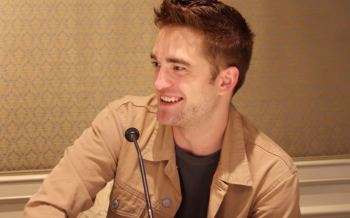
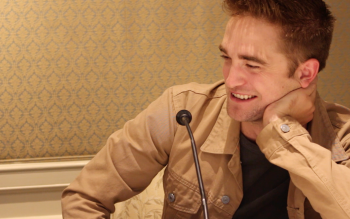
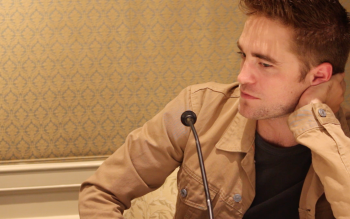
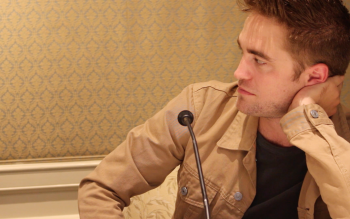
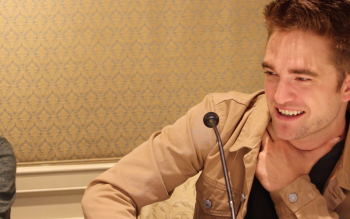
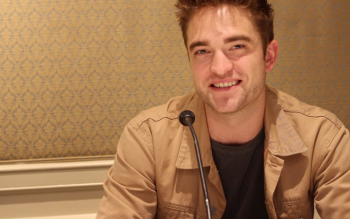
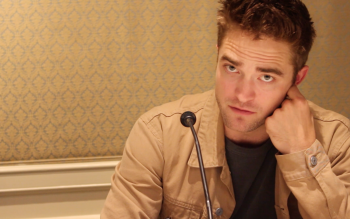
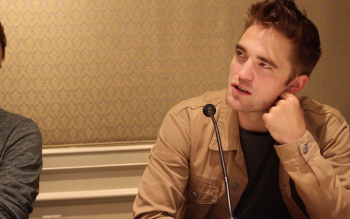
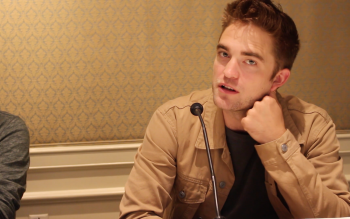
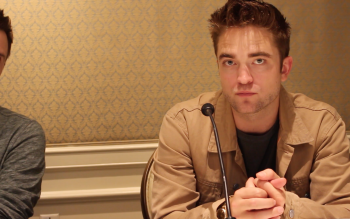
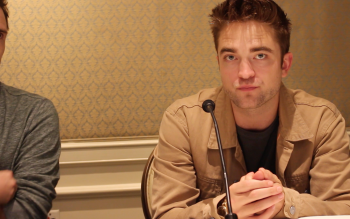
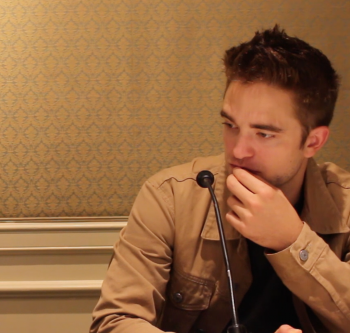
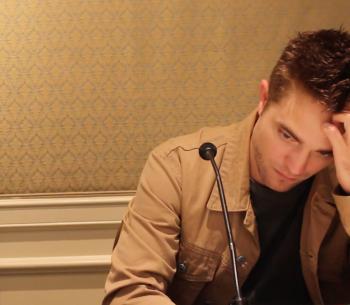
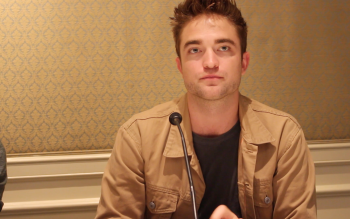
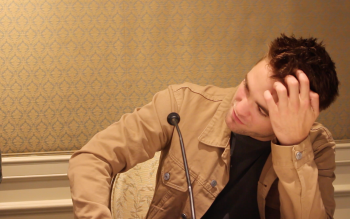
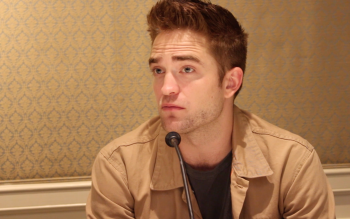
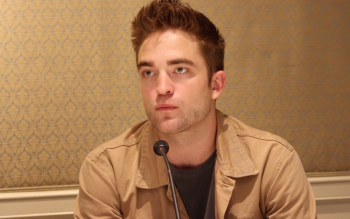
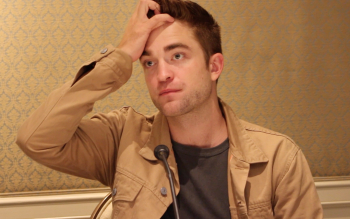
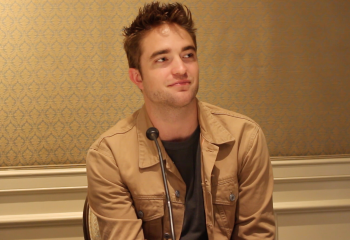
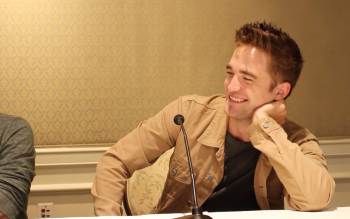
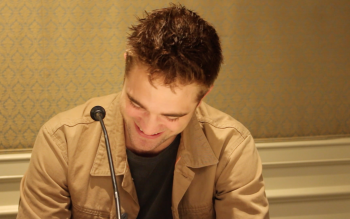
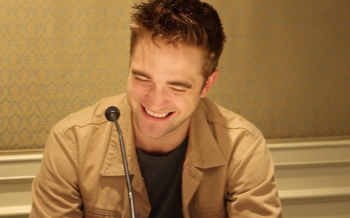
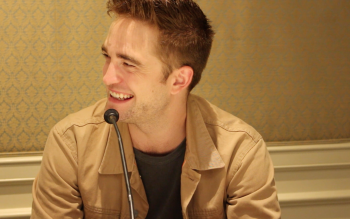
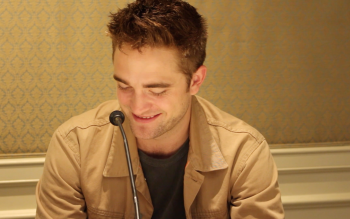
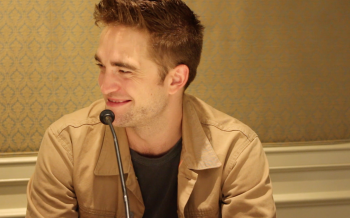
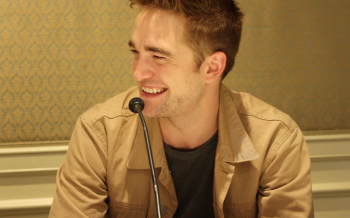
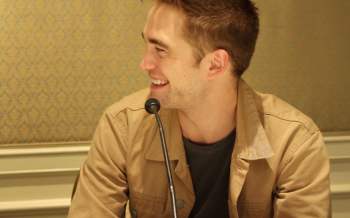
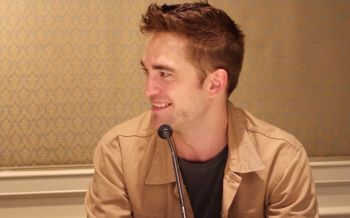
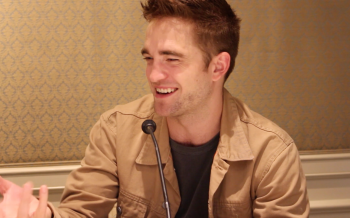
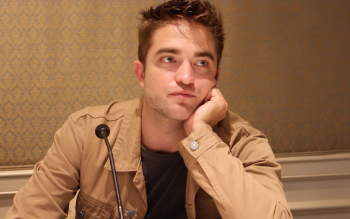
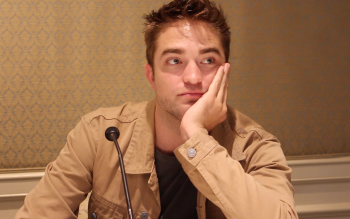
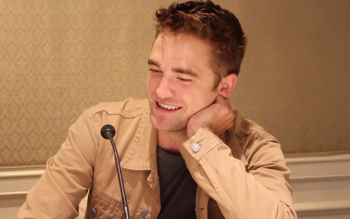
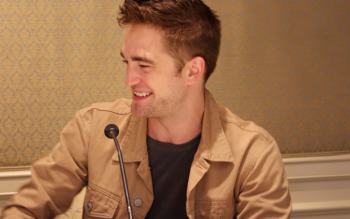
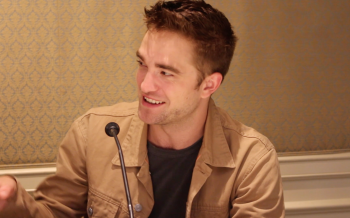
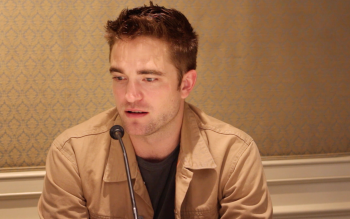
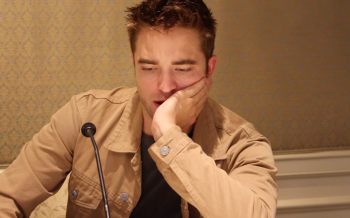
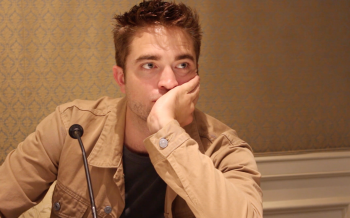
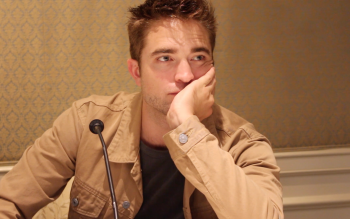
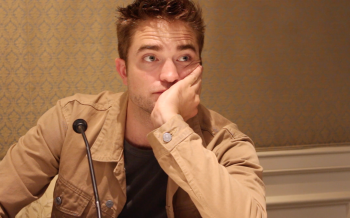
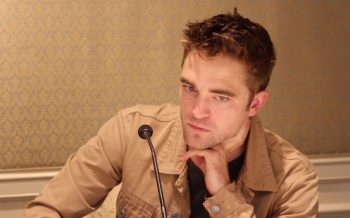
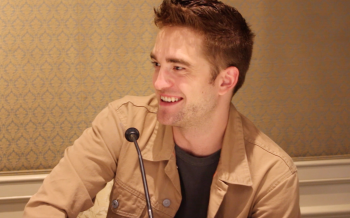
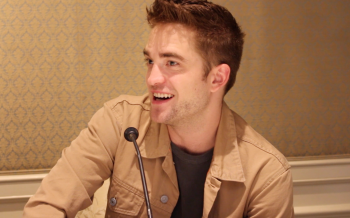
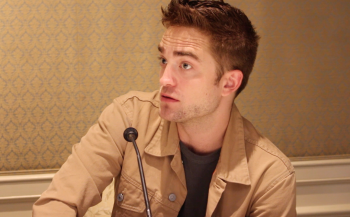
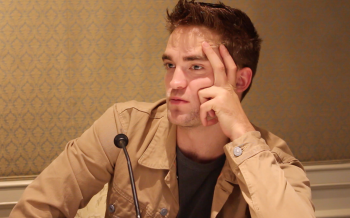
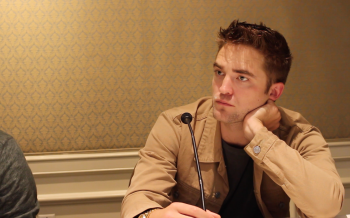
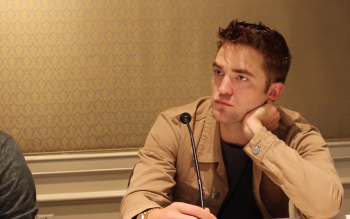
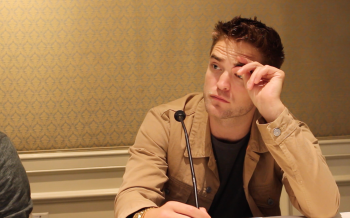
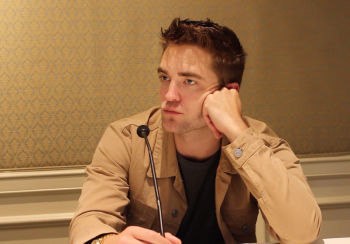
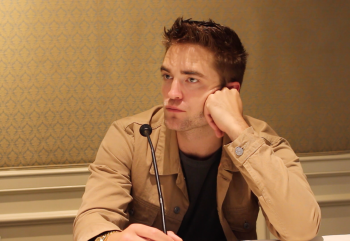
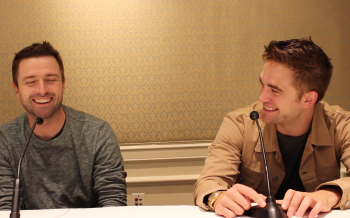
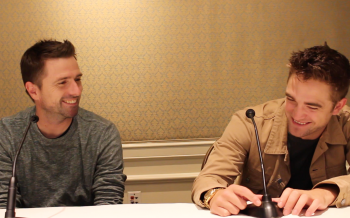
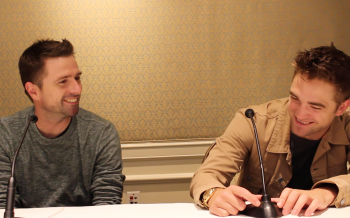
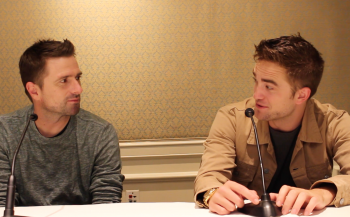
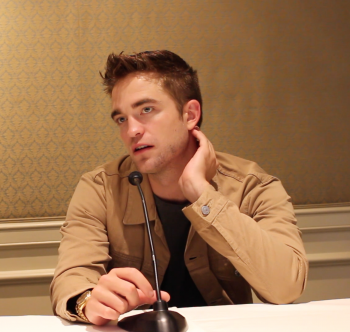
MQ







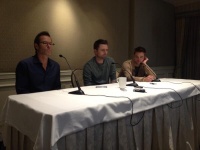
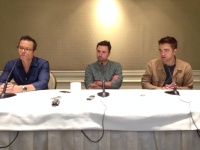







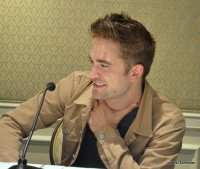
Interviews
MTV
Daily Beast
DailyBeast For awhile, it seemed as if the eerily handsome British actor would have an impossible time getting past the iconic Twilight role that first brought him global fame and fortune. The series was too popular. His looks were too vampiric. And no one who plays the same part more than, say, three times ever really shakes it. (See: Connery, Sean.)
But in the years since the final Twilight installment came and went from theaters, Pattinson has begun to accomplish the impossible. Again and again he has chosen to work with brilliant auteurs—Werner Herzog, David Cronenberg, James Gray, Olivier Assayas—and again and again he has stunned audiences with his smart, sensitive, and very un-Cullen-like performances.
Pattinson’s latest movie, a spare, dystopian Western called The Rover, is his finest work yet. Under the direction of David Michod (the excellent Animal Kingdom), Pattinson stars as Rey, a gut-shot simpleton from the American South who encounters Eric (Guy Pearce) in the sweltering, lawless Australian outback ten years after a global economic collapse. In the wake of a botched heist, Rey’s gang—which includes Rey’s brother—has left him behind to die. The gang has also stolen Eric’s car. And so Rey and Eric team up to track them down. Pattinson is absolutely magnetic in the role, transforming what could have a been an embarrassing caricature of a man-child into empathetic portrait of a wounded human being struggling to think for himself for the first time—and ultimately succeeding. Not many actors can make cogitation look so compelling. Pattinson, somehow, is one of them.
To discuss his work in The Rover—and his career more generally—Pattinson recently sat down with The Daily Beast in Los Angeles. He was as striking in person as he is on screen—thin, white v-neck t-shirt, two-day scruff, artful bedhead. His demeanor is more boyish, and less confident, than one might expect of a movie star; he rarely made eye contact as he spoke and he laughed, half-nervously, whenever he said something revealing.
“I forget how to act in between every single movie,” Pattinson confessed.
He went on to talk about why Twilight has become a burden; why he could never do what Jennifer Lawrence does; and why he loves to work with auteurs such as Harmony Korine, with whom he’s planning to collaborate next. Pattinson also shot down the rumors that he will be taking over for Harrison Ford as Indiana Jones or Han Solo in the near future—although he didn’t shut the door on all future franchises.
“You're sort of floating. You don't know how it happens, but it's amazing. And it's nothing to do with the audience or anyone else. You're still probably shit. But it's so addictive, and it's so rare as well.”
You've said that you “really, really fought” for the role of Rey. Why?
Weirdly, I got sent the script and misread the email. I thought it was an offer. I was like, “Wow. I know exactly how to do this—and I never get offered stuff like this, ever!” So I call up my agent and I’m like, “I want to do it! I want to do it right now!” I had wanted to work with David Michod for years before this. But then they were like, “No, it’s just an audition. What are you talking about?” [Laughs] I suddenly had this pang of terror. I’ve basically messed up every audition I’ve ever gone for.
So what did you do?
I just realized I have to get it, so I just put in an enormous amount of time—way more work than I’ve ever done for an audition before.
What do you mean by “way more work”? What kind of labor are we talking about here?
I mean, I would just run it literally 10 hours a day for, like, two weeks.
Wow.
Completely obsessively, to the point where I was dreaming about it and stuff. I don’t know particularly what I was doing—just constantly thinking about it.
I guess it paid off.
[Laughs] Most auditions you don’t go in like you’re actually doing the movie. You do it like you’re doing an audition. But this I was just doing the movie in someone’s house. Full on.
You said you don’t usually get offered roles like Rey. How so?
Little weirdo roles. There are about five or six actors who have had a lock on them for years. [Laughs] I’m not sure what place I was really put in, but I wasn’t really part of that group of strange character actors—people who are a little bit “weak.” A little fragile and broken. I guess I wasn’t interpreted as being one of those people.
What was the biggest challenge for you in making The Rover?
Nothing really. Even before I got the part, I was so clear about how I wanted to do it. Really the only strange aspect was walking into the audition room and being like, “Am I doing this entirely wrong? I have no idea.” I had one little moment of panic. But as soon as I got I knew what I wanted the clothes to be, what I wanted the look to be—I knew everything. I wanted someone who couldn’t quite fulfill his emotions. He’s just constantly stuck between two things. And also someone who’s never really been required to think and is suddenly forced into thinking for the first time. Basically like playing a baby as an adult. It just felt so right, right from the beginning.
Did you base your portrayal of Rey on anyone in particular?
He’s a little bit like one of my cousins, actually. [Laughs] The clothes, the walk.
How was making The Rover different than making the Twilight movies?
It wasn’t freezing cold. [Laughs] I think that’s actually the biggest thing. When everyone’s so miserable because it’s so freezing cold…the boiling hot Australian outback I would take over the freezing cold any day.
Why?
The cold makes people stressed. There wasn’t as much light in the day to shoot with in Vancouver. And this was just, like, the same weather every day. There’s no one pressuring you to do anything. It’s David’s movie and there are basically only two people in it. You don’t have to rush anything. There’s only two egos you have to deal with. [Laughs]
The fewer egos, the better. Let’s rewind for a second: What made you want to be an actor in the first place—and what made you think you could do it?
I joined this drama club when I was 16 because I fancied this girl who went to it. [Laughs] I’d never done any acting before. But they were doing Guys & Dolls, and I’d never sung but for some reason I really wanted to be in it. [Laughs] I have no idea why, to this day. I did that, and another play afterwards, then randomly got an agent. But I think it was just the first time you do something—performance—it’s incredibly addictive. I remember doing Tess of the d’Urbervilles—the Thomas Hardy thing. I did this scene where I slapped Tess in the face. And just seeing people in the front row going [gasps in horror]—you suddenly have this massive burst of energy through you. Suddenly seeing people look at you like that—you’re like, “Wow! No one has ever looked at me like that before.”
It’s a strange feel. And then you start to feel it for yourself as you get older. You realize that you can get lost. It’s like doing music—you can do a scene and be like, “I don’t feel like myself at all.” And you don’t know where it came from. It’s kind of nice.
Getting away from yourself is an addictive feeling, isn’t it?
Yes. I used to play music all the time, and that was all I wanted to do in music—get to the point where you’re sort of floating. You don’t know how it happens, but it’s amazing. And it’s nothing to do with the audience or anyone else. You’re still probably shit. [Laughs] But it’s so addictive, and it’s so rare as well. You’re just constantly trying to go for that, every time.
Twilight was obviously a blessing to you. But how has it been a burden?
There’s been a lot of hate, actually. Honestly, though, I don’t understand the backlash against Twilight. The first movie, everyone liked it. But then it was suddenly… I don’t quite get why people turned on the other ones. There are plenty of successful franchises which everyone accepts. But for some reason there were all these political arguments against. People saying, “Oh, it’s a bad example for women.” Blah, blah, blah. As if we were all a bunch of dumbasses. We’re not playing it that way! That’s purely your interpretation! We’re not trying to make a movie about subservient female characters at all.
In a lot of ways, people have decided what Twilight is about before they’ve even thought about it, and then they’ve labeled us, the actors, as part of whatever that may be. Even the sparkling thing. I get so many sparkly criticisms! But I don’t actually remember a moment of in any of the movies where I sparkle. [Laughs] Maybe one second in the first one. It’s like, really? All these fanboys are like, “You’re sparkling!” And I’m like, “Really? You must have freeze framed that one second.” [Laughs] It’s just the idea of sparkling—people lost their minds over it.
But at the same time you find that the people who think they hate you can be incredibly loyal. They go to see your movies to hate on you. [Laughs] That’s fine with me!
What about artistically? Has all the Twilight hubbub—the cultural obsession around it—given people an inaccurate sense of who you are as an actor?
I don’t know who I am as an actor. I’ve found that the Twilight movies were probably the hardest jobs I’ve done. You have so many parameters to play the character within, and also you’re doing five movies where you have to play the same point every time and figure out different variations on it. It was really hard. It was like trying to write a haiku.
Did Twilight make you a better actor?
Yeah. It’s funny, because the reviews got worse.
But now that you’re doing movies like The Rover—darker, deeper, more artistic movies—do you feel like you’re trying to escape from Edward Cullen?
No, not at all. I never even thought of all the Twilights as a single entity. They were all separate movies for me. I mean, I forget how to act in between every single movie. [Laughs] But I’ve always thought that nothing comes for free. You get paid a bunch of money. You get a bunch of opportunities. And you’ve got to pay for it somehow. And in my case, I paid for it by having to figure out how to walk down the street [without getting mobbed]. I paid for it by people thinking I was one thing. That’s my major desire as an actor—to have no one know who I am. To have no preconceptions. So obviously when a character becomes iconic, you have to deal with the baggage that comes with it.
Since Twilight, you’ve been making a point of working with auteurs: Werner Herzog, David Cronenberg, James Gray, Olivier Assayas, David Michod. Why? Is this your way of making sure that people don’t peg you as “one thing"?
Those are the people I’ve loved since I was a teenager. It almost seems like a joke that I’m working with them now. They’re also people who have gotten performances out of actors that made me want to be an actor, before I even was an actor. Especially James Gray—Joaquin [Phoenix]’s stuff with James. That guy can get really singular performances out of people. And with Harmony Korine as well. Really it’s just limiting your margin for failure. I genuinely think you can’t fail doing a Werner Herzog movie or a Harmony Korine movie. You know they’re not going to just phone something in. They haven’t ever. Take Cronenberg. I still think Cronenberg is so cutting-edge—and he’s been working for 45 years. Whereas some people now are already flopping on their second movie. Already selling out.
Speaking of Cronenberg, you once said that making Cosmopolis “reinvigorated” your “ideas about acting.” How?
I just made me realize that I could be in those kinds of movies. All throughout doing Twilight, I got asked whether I was afraid of getting typecast. I started thinking, “Yeah, I guess I am.” Then I got cast in Cosmopolis, which was just so far from my wheelhouse, and I was like, “Oh, I guess I shouldn’t be afraid of being typecast anymore.” It freed me up. And I loved the experience so much—getting into Cannes was such a massive deal to me. I’m just trying to go after that again.
Which actors do you look at and say, “That’s the kind of career I want to have?”
I like what Joaquin has done. I’m always looking at his stuff—he’s been the most influential actor on me. And in a lot of ways I like Guy’s career as well. But he also does Australian stuff all the time, and I feel weird doing English things. I feel like I’m really naked.
What about someone like Jennifer Lawrence? She’s balanced two studio franchises with lots of meatier parts.
She’s amazing. She’s absolutely incredible. But also we’re different types of people. She seems like she’s super-confident—and I don’t have the kind of confidence. She glows. I think you can fit that into quite a few different areas. Whereas I’ve got a kind of sneak-through-the-cracks style.
The rumors are circulating, so I have to ask. Will you be the next Indiana Jones?
No. [Laughs] But I mean, I don’t know. That would be so funny if I suddenly got offered it. I’d be like, “Oh shit!” [Laughs]
So the rumor has no basis in reality?
No, no.
What about another famous Harrison Ford role: Han Solo? The buzz is that you’re being considered for a standalone Solo movie.
Oh no. I think all of these things are made up so I get tons of bad press.
Bad press? Those are two of the greatest characters in the history of Hollywood.
But literally this random story comes out and I get 50 other stories saying, like, “THAT GUY? NOOOO! What an asshole!”
For the record, though: you’re a fan of Han and Indy?
100 percent. Everyone is.
But that’s all for now.
Right.
Would you ever do another franchise?
Yeah. I’d have to put a lot of thought into it first. But in a lot of ways, those are the only big movies that are made anymore. [Laughs] So unless you just never want to do studio movies, you have to realize that you’ve got to do The Fault in Our Stars 2. [Laughs]
In The Rover’s bleak universe, there is virtually no backstory — illustrative of a world in which nothing really matters — and we know little about Robert Pattinson’s Rey other than that he and his older brother (Scoot McNairy) are in a small band of thugs who were violently thwarted during a criminal act we don’t see. An injured Rey has been abandoned for expedience’s sake, which is how he becomes a hostage to Eric (Guy Pearce), whose car has been stolen by Rey’s former friends. (Eric really wants that car back, for a reason that is revealed only in the movie’s final moments.) As Rey, Pattinson plays a “half-wit,” as Eric calls him, a far cry from Twilight’s Edward Cullen, the emo vampire who served as a tweenage fantasy.
The Rover is David Michôd’s second feature as a director, following up on 2010’s lauded, provocative Animal Kingdom. And though it takes place in Australia, where Michôd is from, Rey and his brother inexplicably have American Southern accents. It’s good for Pattinson to sound nothing like Edward, the character that made him famous. Rey starts out fearful — in one scene he folds himself into a fetal position. But he also changes as the movie goes on (to describe would be to spoil). In Variety, Scott Foundas called it a “career-redefining performance” for Pattinson.
In an interview with BuzzFeed this week in Beverly Hills, Pattinson discussed The Rover (which premiered at Cannes last month and comes out in New York and Los Angeles this weekend, and will be released nationally next Friday), and his post-Twilight career. And he has been working a lot: In addition to David Cronenberg’s Maps to the Stars, which also premiered at Cannes, he will soon appear in Werner Herzog’s Queen of the Desert, Anton Corbijn’s Life, and Olivier Assayas’ Idol’s Eye with Robert De Niro, which has not yet begun filming. As someone who tripped into huge stardom after he was cast in Twilight, and then fell into a viper’s nest of paparazzi as one-half of a tabloid couple while he dated his co-star Kristen Stewart, Pattinson, now 28, described life after Edward as a “process.”
He has now lived a good portion of his life hunted, both by paps and fans, but in person, he is neither brooding nor tortured. Actually, he was quick to laugh. And he seems to have figured out how to live a sane life, if not a normal one.
You do a Southern accent for this movie, as well as a number of vocal and facial tics. Were those as written or did you develop them with David Michôd?
Robert Pattinson: It said he was from the South, but not a specific place. I guess all those sorts of tics and things — it was just quite jerkily written? So when you start saying it out loud, it just ends up coming out in your body.
The Rover seems like it was grueling to make. It looks hot, and there are all those flies. Was it? And was that helpful for the role?
RP: I thought it was really easy. I think the most stressful thing in movies is when the weather is really random. Then everyone is just panicking all the time. But it was just sort of hot all the time. If you were trying to play someone who was clean, then it would be incredibly stressful. To have someone coming in and touching up your makeup every 10 seconds — but you were just sitting in a pile of mud, it doesn’t really make a difference. You could just play in the dirt.
You were wearing the same thing the entire time.
RP: I don’t even think they had doubles of the clothes. It took a long time. We went through hundreds of pairs of jeans. It was mainly about the feel — the way the costume department distressed them. We literally put glue in it to make them sit a certain way. They were, like, thick. But I just kind of knew how I wanted to feel. Also, the T-shirt, I knew from the audition exactly what T-shirt I wanted to wear. The colors and everything.
I want to ask about the scene when you sing along with “Pretty Girl Rock.” It’s out of nowhere, and lovely.
RP: When I got to that part in the script, that was one of the main turning points: Wow, this is completely on another level to most things I’m reading. And so brave as well — doing something that could be completely baffling to people. I thought it was going to be a tiny insert, and when I walked in to do the scene, David’s got this massive push-in on a track that’s like a 100-foot-long track. And just pushing in for almost the entire song. It was kind of great.
It was a sweet moment — you really feel for the character who’s never lived a different kind of life.
RP: He’s never really learned how to think like a normal person. He has no concept of what his decisions will affect, because no decision he’s ever made has ever affected anything before.
Twilight made you a rich movie star and paparazzi target. Now that it’s been almost two years since Breaking Dawn Part 2 came out, how do you look back on the experience?
RP: I knew when I signed up after the first one came out, I knew it was going to be about a 10-year process to really — I’m not sure what! To get to the next plateau. I’ve been extremely lucky as well, but it kind of does seem like there’s little gradations — every year, every job, something happens, and people’s perception changes a little bit. I don’t look back on it being a different part of my life. It’s all one road, really.
A lot of are actors go back and forth between big studio movies and smaller indies. But since Twilight, you seem like you’ve avoided studio films. Is that deliberate?
RP: It hasn’t really come up. Maybe there was a little period after the first Twilight where just because you’re the new thing, you get offered a bunch of big budget things. And nothing really connected with me. But I think my energy and also how people perceive me — I don’t fit too many roles like that. I never played team sports in school, and I think people can tell! As I get older, the parts become a little bit more open. But the young guy parts in big budget movies, you can always tell the guy has played team sports. I hated them.
I was going to ask you whether you feel Twilight has held you back, but now I think I should ask whether or not playing team sports has.
RP: It’s just weird. I think I just gravitate toward loner parts. I feel my emotional reactions to things are quite off a little bit. I remember doing Twilight and Catherine Hardwicke just being, like, “Why are you looking at her like that? You look like you want to kill her.” I’m, like, “I do? That’s, like, a love look!” I try to do things with Cosmopolis and this — it’s an emotional spectrum that’s slightly off. I feel like I can commit to that a little bit more than hit the traditional beats.
You seem very director-focused in your choices.
RP: You try and limit the margin for error as much as you can. Even if you end up doing a shitty movie, but you’ve been working with Herzog or something, you’re not doing a superhero movie that’s supposed to be something completely different. And then if you make a shitty superhero movie, it’s like, what do you expect?
Did you just say that the Werner Herzog movie you’re in, playing T.E. Lawrence, is shitty?
RP: No, not at all! I’m hardly in it anyway.
Oh, is that right? I couldn’t tell.
RP: I was only there for like 10 days. No, I think it’s going to be cool. I saw some of the stuff with Franco and Nicole Kidman that looked really good. It’s insurance. With Michôd, I wanted to work with him for ages. I thought Animal Kingdom was one of the best debuts in the last 10 years.
You have a bunch of movies coming up, but one that jumped out at me was Life, the story of James Dean and Dennis Stock, the photographer. A lot of the parts you’ve taken since Twilight seem to have nothing to do with your life experience — but the idea of photography and a young star does intersect.
RP: It’s funny, I didn’t think about that. What I liked about it was that it was about professional jealousy. It was before James Dean was famous, but obviously he loved having his photo taken. Both of them were super arrogant, and they both think they’re the artist. Dennis was so filled with neuroses and jealous of everything. I didn’t really think about the celebrity aspect of it. I don’t think Dennis ever thought about it. Also, I think afterward, he was pissed that that was his legacy.
I read an interview with you recently in which you said you weren’t sure whether you’ve found your feet yet as an actor. Do you think you ever will?
RP: I don’t know. In some ways, hopefully not. The only thing I deal with every single job is trying to overcome confidence issues. I think in some ways, it’s helped me just having fallen into it, and not really being, like, I need this. That’s when you go crazy and you lose control of your personal life. In some ways, it is very frustrating when I’ll know how to do something in my head, and something inhibits it. It just drives me nuts. I think it’s good when there’s no expectations of the character. And then I’m fine.
What do you do when you find you can’t do something?
RP: It’s just, like, horrible. There was one moment when I was doing Life. I knew exactly how to do this scene. I’d been planning the whole scene for the whole movie. And it just, for whatever reason, it was just not happening. And no one else knows. I’m just, like, losing my mind on the set. Everyone’s so uncomfortable. Also, with a little bit of experience you realize, OK, I’m just going to not let anyone else speak, and deliver each line in about 10 different ways. And hopefully they’ll fix it in the edit! Can you just make my performance for me?
Is it frustrating?
RP: It’s the most horrible thing ever. Especially because most of the time, especially in big emotional scenes, it’s just because you feel like you’re faking it. And you know how not to fake it, but it’s not happening in your body. And there’s nothing you can do. At the end of the day, people watching it half the time can’t tell at all. Or 90% of the time, you can watch a scene you think is the worst scene ever and you’re completely faking it — and no one knows.
I recently reread that Vanity Fair cover story about you from 2011 during which your life seemed pretty unlivable because of the paparazzi. Have things improved at all?
RP: I remember doing that interview, and I thought I was, like, telling jokes. Then the interview comes out and it sounds like I’m about to kill myself.
Oh! Part of it was her commenting on what she observed about what your life was like.
RP: I was, like, How have you observed this? We just sat in someone’s house. Whatever. I guess from an outside perspective, there’s a period of contraction in your life where you have to get used to what feels like your life becoming impossibly smaller. But that was about four years ago. I felt a little funny then. But you realize what you like doing, and suddenly it becomes easier. Some people get OK getting photographed doing their groceries or going out of whatever. I realized I cannot handle that at all. And so, I just don’t go to places where I get photographed. And as soon as I made that decision — don’t worry about it, stop complaining about it — it was a massive weight taken off.
So, there are ways to live your life not being photographed?
RP: Yeah. 100%.
Even here in L.A.?
RP: There are a very limited amount of places you can go. If you go to The Grove, you’ve got to accept something is going to happen.
You can’t go to the Apple Store at The Grove.
RP: I miss that place. Watching the fountains!
So, you like living in Los Angeles? I mean, you could live wherever you want.
RP: I always thought I was going to move back to London, but London’s changed so much since I left. A lot of my friends have left and stuff, or they have families. It’s different. Also, my main interest in my life at the moment is film, and this is the best place to be for film. Also, I like the kind of levity of living here as well. People want to get stuff done — they’re not downers all the time. In a lot of big cities, most people are just, like, Oh, god, it’s impossible. People aren’t like that in L.A. And I really like it.
In that Vanity Fair interview, you said you admired Charlie Sheen —
RP: I did?
I’m sure it was very of the moment! You said you liked that he was a crazy person who doesn’t give a fuck. And in The Hollywood Reporter recently, you talked about being a fan of Harmony Korine’s for what I imagine are the same reasons. Could you not give a fuck if you tried?
RP: I do, in a way. But I don’t want people to hate me. I basically do whatever I want. But one of the aspects of what I want is, I want people to like me!
Let’s talk about your look in this film. People have said you “uglified” yourself for the role.
The one weird thing [I had] was the teeth. I thought everyone was going to have s—-ty teeth in it. Then I end up being the only person in it with s—-ty teeth in it [laughs]. But I kind of liked the idea of it, because I went to school with people who didn’t brush their teeth when they were kids, and they always ended up being weirdos.
What did you do to get those nasty teeth?
It’s like paint, and whenever there was a long scene, it would wipe off my teeth. So I would end up with white teeth at the end of the scene, which eventually became a massive hassle. But it was still kind of cool. It was such an odd look when you turn around and see yourself [in the mirror] and there’s this weird thing coming out of your face.
Did you go out in public much to get reactions, or even just to get in character?
Yeah, [but] there was nowhere to go, really. It’s funny: Whenever you have your head shaved, less people come up to you and ask for pictures [laughs]. That’s why I always try to keep my hair really short.
They’re like, “No, no, I don’t want that Robert Pattinson.”
Exactly. “I want the sexy one!”
You very memorable sing along to the Keri Hilson song "Pretty Girls Rock" in this film. Did you have any hand in picking that track?
I do kind of really like that song. I didn’t realize how massive a song it was. I had never heard it before. David emailed it to me and I was like, “Wow, where did you find this?” I thought it was an original track, or a really small thing that he’d found somewhere. But I thought it was kind of perfect for it. As soon as he played it, I was like, “That’s hilarious.”
What’s your relationship with pop music? Are you a fan?
I guess I don’t listen to that much pop music. I listen to almost exclusively hip-hop, especially in L.A. I listen to Shade 45 on Sirius.
What are your jams?
I’m kind of obsessed with Tyga at the moment. I don’t know why, I’ve suddenly had this resurgence of hip-hop. I didn’t listen to it for years, and now I’m obsessed. When I was in school, from like 1997 to 2003, I was really, really into hip-hop. All of my favorite songs are from then. But there’s a couple of new people; I actually really like Chris Brown’s stuff [laughs].
Amy Nicholson, the critic from LA Weekly, wrote of The Rover, “Pattinson appears to have picked this role precisely because it will send his Twilight fans screaming out of the theater.” Any truth to that?
No, I don’t want anyone running out of the theater! I want everyone coming into the theater [laughs]. It’s kind of curious how people interpret it. There’s an element of wanting to see [my Rover character] in a sympathetic way, because of Twilight. But I wasn’t trying to play it sympathetically at all. [laughs] I mean, he kills people. And he’s not quite there.
So clearly critics as well as your fans are making this connection from “A” to “B” but that’s not something you ever think about?
Yeah. I mean a lot of people take away completely different things. I never really try to predict how people are going to react to something. Because I have no idea. I’ve approached every movie thinking like, “I’m going to do the best thing ever.” [laughs] And then regardless of what critics or an audience or anybody says afterwards, I either like it or I don’t —that’s the only thing I care about.
Is there any part of you that misses the sheer madness that accompanied the Twilight series?
Um….when you’re doing the movies, it’s the same thing. I’ve realized how much I loved shooting way outside of the city, because I just can’t stand people taking photos. Even when I was just doing this movie Life in Toronto, we were still out in the middle of nowhere, but it was only about an hour from Toronto. And just everyday, there’s [paparazzi] taking photos with long lenses. And then you can’t talk to anybody on the crew unless you want to have a million photographs. And I feel like I’m putting money into those guys’ pockets by just standing outside. So I’ll constantly hide to make their life as difficult as possible. But then it makes your life difficult as well.
Has it become kind of a game ducking them, or is it just pure annoyance?
It’s literally just [that] I don’t want them to have anything for free. And people who see the pictures, they just assume if you’re getting photographed a lot, it’s because you want to. So if you try to claim privacy afterwards, they’ll be like, “Well what you didn’t care that time.” So you have to be pretty consistent, and say like, “I never want to get photographed, ever.”
Do you ever have to go out in disguise?
It never really works. But I do have a lot of little tricks, like car switches and stuff. You end up being like a bit of a spy. [laughs] Very covert.
But in the years since the final Twilight installment came and went from theaters, Pattinson has begun to accomplish the impossible. Again and again he has chosen to work with brilliant auteurs—Werner Herzog, David Cronenberg, James Gray, Olivier Assayas—and again and again he has stunned audiences with his smart, sensitive, and very un-Cullen-like performances.
Pattinson’s latest movie, a spare, dystopian Western called The Rover, is his finest work yet. Under the direction of David Michod (the excellent Animal Kingdom), Pattinson stars as Rey, a gut-shot simpleton from the American South who encounters Eric (Guy Pearce) in the sweltering, lawless Australian outback ten years after a global economic collapse. In the wake of a botched heist, Rey’s gang—which includes Rey’s brother—has left him behind to die. The gang has also stolen Eric’s car. And so Rey and Eric team up to track them down. Pattinson is absolutely magnetic in the role, transforming what could have a been an embarrassing caricature of a man-child into empathetic portrait of a wounded human being struggling to think for himself for the first time—and ultimately succeeding. Not many actors can make cogitation look so compelling. Pattinson, somehow, is one of them.
To discuss his work in The Rover—and his career more generally—Pattinson recently sat down with The Daily Beast in Los Angeles. He was as striking in person as he is on screen—thin, white v-neck t-shirt, two-day scruff, artful bedhead. His demeanor is more boyish, and less confident, than one might expect of a movie star; he rarely made eye contact as he spoke and he laughed, half-nervously, whenever he said something revealing.
“I forget how to act in between every single movie,” Pattinson confessed.
He went on to talk about why Twilight has become a burden; why he could never do what Jennifer Lawrence does; and why he loves to work with auteurs such as Harmony Korine, with whom he’s planning to collaborate next. Pattinson also shot down the rumors that he will be taking over for Harrison Ford as Indiana Jones or Han Solo in the near future—although he didn’t shut the door on all future franchises.
“You're sort of floating. You don't know how it happens, but it's amazing. And it's nothing to do with the audience or anyone else. You're still probably shit. But it's so addictive, and it's so rare as well.”
You've said that you “really, really fought” for the role of Rey. Why?
Weirdly, I got sent the script and misread the email. I thought it was an offer. I was like, “Wow. I know exactly how to do this—and I never get offered stuff like this, ever!” So I call up my agent and I’m like, “I want to do it! I want to do it right now!” I had wanted to work with David Michod for years before this. But then they were like, “No, it’s just an audition. What are you talking about?” [Laughs] I suddenly had this pang of terror. I’ve basically messed up every audition I’ve ever gone for.
So what did you do?
I just realized I have to get it, so I just put in an enormous amount of time—way more work than I’ve ever done for an audition before.
What do you mean by “way more work”? What kind of labor are we talking about here?
I mean, I would just run it literally 10 hours a day for, like, two weeks.
Wow.
Completely obsessively, to the point where I was dreaming about it and stuff. I don’t know particularly what I was doing—just constantly thinking about it.
I guess it paid off.
[Laughs] Most auditions you don’t go in like you’re actually doing the movie. You do it like you’re doing an audition. But this I was just doing the movie in someone’s house. Full on.
You said you don’t usually get offered roles like Rey. How so?
Little weirdo roles. There are about five or six actors who have had a lock on them for years. [Laughs] I’m not sure what place I was really put in, but I wasn’t really part of that group of strange character actors—people who are a little bit “weak.” A little fragile and broken. I guess I wasn’t interpreted as being one of those people.
What was the biggest challenge for you in making The Rover?
Nothing really. Even before I got the part, I was so clear about how I wanted to do it. Really the only strange aspect was walking into the audition room and being like, “Am I doing this entirely wrong? I have no idea.” I had one little moment of panic. But as soon as I got I knew what I wanted the clothes to be, what I wanted the look to be—I knew everything. I wanted someone who couldn’t quite fulfill his emotions. He’s just constantly stuck between two things. And also someone who’s never really been required to think and is suddenly forced into thinking for the first time. Basically like playing a baby as an adult. It just felt so right, right from the beginning.
Did you base your portrayal of Rey on anyone in particular?
He’s a little bit like one of my cousins, actually. [Laughs] The clothes, the walk.
How was making The Rover different than making the Twilight movies?
It wasn’t freezing cold. [Laughs] I think that’s actually the biggest thing. When everyone’s so miserable because it’s so freezing cold…the boiling hot Australian outback I would take over the freezing cold any day.
Why?
The cold makes people stressed. There wasn’t as much light in the day to shoot with in Vancouver. And this was just, like, the same weather every day. There’s no one pressuring you to do anything. It’s David’s movie and there are basically only two people in it. You don’t have to rush anything. There’s only two egos you have to deal with. [Laughs]
The fewer egos, the better. Let’s rewind for a second: What made you want to be an actor in the first place—and what made you think you could do it?
I joined this drama club when I was 16 because I fancied this girl who went to it. [Laughs] I’d never done any acting before. But they were doing Guys & Dolls, and I’d never sung but for some reason I really wanted to be in it. [Laughs] I have no idea why, to this day. I did that, and another play afterwards, then randomly got an agent. But I think it was just the first time you do something—performance—it’s incredibly addictive. I remember doing Tess of the d’Urbervilles—the Thomas Hardy thing. I did this scene where I slapped Tess in the face. And just seeing people in the front row going [gasps in horror]—you suddenly have this massive burst of energy through you. Suddenly seeing people look at you like that—you’re like, “Wow! No one has ever looked at me like that before.”
It’s a strange feel. And then you start to feel it for yourself as you get older. You realize that you can get lost. It’s like doing music—you can do a scene and be like, “I don’t feel like myself at all.” And you don’t know where it came from. It’s kind of nice.
Getting away from yourself is an addictive feeling, isn’t it?
Yes. I used to play music all the time, and that was all I wanted to do in music—get to the point where you’re sort of floating. You don’t know how it happens, but it’s amazing. And it’s nothing to do with the audience or anyone else. You’re still probably shit. [Laughs] But it’s so addictive, and it’s so rare as well. You’re just constantly trying to go for that, every time.
Twilight was obviously a blessing to you. But how has it been a burden?
There’s been a lot of hate, actually. Honestly, though, I don’t understand the backlash against Twilight. The first movie, everyone liked it. But then it was suddenly… I don’t quite get why people turned on the other ones. There are plenty of successful franchises which everyone accepts. But for some reason there were all these political arguments against. People saying, “Oh, it’s a bad example for women.” Blah, blah, blah. As if we were all a bunch of dumbasses. We’re not playing it that way! That’s purely your interpretation! We’re not trying to make a movie about subservient female characters at all.
In a lot of ways, people have decided what Twilight is about before they’ve even thought about it, and then they’ve labeled us, the actors, as part of whatever that may be. Even the sparkling thing. I get so many sparkly criticisms! But I don’t actually remember a moment of in any of the movies where I sparkle. [Laughs] Maybe one second in the first one. It’s like, really? All these fanboys are like, “You’re sparkling!” And I’m like, “Really? You must have freeze framed that one second.” [Laughs] It’s just the idea of sparkling—people lost their minds over it.
But at the same time you find that the people who think they hate you can be incredibly loyal. They go to see your movies to hate on you. [Laughs] That’s fine with me!
What about artistically? Has all the Twilight hubbub—the cultural obsession around it—given people an inaccurate sense of who you are as an actor?
I don’t know who I am as an actor. I’ve found that the Twilight movies were probably the hardest jobs I’ve done. You have so many parameters to play the character within, and also you’re doing five movies where you have to play the same point every time and figure out different variations on it. It was really hard. It was like trying to write a haiku.
Did Twilight make you a better actor?
Yeah. It’s funny, because the reviews got worse.
But now that you’re doing movies like The Rover—darker, deeper, more artistic movies—do you feel like you’re trying to escape from Edward Cullen?
No, not at all. I never even thought of all the Twilights as a single entity. They were all separate movies for me. I mean, I forget how to act in between every single movie. [Laughs] But I’ve always thought that nothing comes for free. You get paid a bunch of money. You get a bunch of opportunities. And you’ve got to pay for it somehow. And in my case, I paid for it by having to figure out how to walk down the street [without getting mobbed]. I paid for it by people thinking I was one thing. That’s my major desire as an actor—to have no one know who I am. To have no preconceptions. So obviously when a character becomes iconic, you have to deal with the baggage that comes with it.
Since Twilight, you’ve been making a point of working with auteurs: Werner Herzog, David Cronenberg, James Gray, Olivier Assayas, David Michod. Why? Is this your way of making sure that people don’t peg you as “one thing"?
Those are the people I’ve loved since I was a teenager. It almost seems like a joke that I’m working with them now. They’re also people who have gotten performances out of actors that made me want to be an actor, before I even was an actor. Especially James Gray—Joaquin [Phoenix]’s stuff with James. That guy can get really singular performances out of people. And with Harmony Korine as well. Really it’s just limiting your margin for failure. I genuinely think you can’t fail doing a Werner Herzog movie or a Harmony Korine movie. You know they’re not going to just phone something in. They haven’t ever. Take Cronenberg. I still think Cronenberg is so cutting-edge—and he’s been working for 45 years. Whereas some people now are already flopping on their second movie. Already selling out.
Speaking of Cronenberg, you once said that making Cosmopolis “reinvigorated” your “ideas about acting.” How?
I just made me realize that I could be in those kinds of movies. All throughout doing Twilight, I got asked whether I was afraid of getting typecast. I started thinking, “Yeah, I guess I am.” Then I got cast in Cosmopolis, which was just so far from my wheelhouse, and I was like, “Oh, I guess I shouldn’t be afraid of being typecast anymore.” It freed me up. And I loved the experience so much—getting into Cannes was such a massive deal to me. I’m just trying to go after that again.
Which actors do you look at and say, “That’s the kind of career I want to have?”
I like what Joaquin has done. I’m always looking at his stuff—he’s been the most influential actor on me. And in a lot of ways I like Guy’s career as well. But he also does Australian stuff all the time, and I feel weird doing English things. I feel like I’m really naked.
What about someone like Jennifer Lawrence? She’s balanced two studio franchises with lots of meatier parts.
She’s amazing. She’s absolutely incredible. But also we’re different types of people. She seems like she’s super-confident—and I don’t have the kind of confidence. She glows. I think you can fit that into quite a few different areas. Whereas I’ve got a kind of sneak-through-the-cracks style.
The rumors are circulating, so I have to ask. Will you be the next Indiana Jones?
No. [Laughs] But I mean, I don’t know. That would be so funny if I suddenly got offered it. I’d be like, “Oh shit!” [Laughs]
So the rumor has no basis in reality?
No, no.
What about another famous Harrison Ford role: Han Solo? The buzz is that you’re being considered for a standalone Solo movie.
Oh no. I think all of these things are made up so I get tons of bad press.
Bad press? Those are two of the greatest characters in the history of Hollywood.
But literally this random story comes out and I get 50 other stories saying, like, “THAT GUY? NOOOO! What an asshole!”
For the record, though: you’re a fan of Han and Indy?
100 percent. Everyone is.
But that’s all for now.
Right.
Would you ever do another franchise?
Yeah. I’d have to put a lot of thought into it first. But in a lot of ways, those are the only big movies that are made anymore. [Laughs] So unless you just never want to do studio movies, you have to realize that you’ve got to do The Fault in Our Stars 2. [Laughs]
BUZZFEED
The Rover is David Michôd’s second feature as a director, following up on 2010’s lauded, provocative Animal Kingdom. And though it takes place in Australia, where Michôd is from, Rey and his brother inexplicably have American Southern accents. It’s good for Pattinson to sound nothing like Edward, the character that made him famous. Rey starts out fearful — in one scene he folds himself into a fetal position. But he also changes as the movie goes on (to describe would be to spoil). In Variety, Scott Foundas called it a “career-redefining performance” for Pattinson.
In an interview with BuzzFeed this week in Beverly Hills, Pattinson discussed The Rover (which premiered at Cannes last month and comes out in New York and Los Angeles this weekend, and will be released nationally next Friday), and his post-Twilight career. And he has been working a lot: In addition to David Cronenberg’s Maps to the Stars, which also premiered at Cannes, he will soon appear in Werner Herzog’s Queen of the Desert, Anton Corbijn’s Life, and Olivier Assayas’ Idol’s Eye with Robert De Niro, which has not yet begun filming. As someone who tripped into huge stardom after he was cast in Twilight, and then fell into a viper’s nest of paparazzi as one-half of a tabloid couple while he dated his co-star Kristen Stewart, Pattinson, now 28, described life after Edward as a “process.”
He has now lived a good portion of his life hunted, both by paps and fans, but in person, he is neither brooding nor tortured. Actually, he was quick to laugh. And he seems to have figured out how to live a sane life, if not a normal one.
You do a Southern accent for this movie, as well as a number of vocal and facial tics. Were those as written or did you develop them with David Michôd?
Robert Pattinson: It said he was from the South, but not a specific place. I guess all those sorts of tics and things — it was just quite jerkily written? So when you start saying it out loud, it just ends up coming out in your body.
The Rover seems like it was grueling to make. It looks hot, and there are all those flies. Was it? And was that helpful for the role?
RP: I thought it was really easy. I think the most stressful thing in movies is when the weather is really random. Then everyone is just panicking all the time. But it was just sort of hot all the time. If you were trying to play someone who was clean, then it would be incredibly stressful. To have someone coming in and touching up your makeup every 10 seconds — but you were just sitting in a pile of mud, it doesn’t really make a difference. You could just play in the dirt.
You were wearing the same thing the entire time.
RP: I don’t even think they had doubles of the clothes. It took a long time. We went through hundreds of pairs of jeans. It was mainly about the feel — the way the costume department distressed them. We literally put glue in it to make them sit a certain way. They were, like, thick. But I just kind of knew how I wanted to feel. Also, the T-shirt, I knew from the audition exactly what T-shirt I wanted to wear. The colors and everything.
I want to ask about the scene when you sing along with “Pretty Girl Rock.” It’s out of nowhere, and lovely.
RP: When I got to that part in the script, that was one of the main turning points: Wow, this is completely on another level to most things I’m reading. And so brave as well — doing something that could be completely baffling to people. I thought it was going to be a tiny insert, and when I walked in to do the scene, David’s got this massive push-in on a track that’s like a 100-foot-long track. And just pushing in for almost the entire song. It was kind of great.
It was a sweet moment — you really feel for the character who’s never lived a different kind of life.
RP: He’s never really learned how to think like a normal person. He has no concept of what his decisions will affect, because no decision he’s ever made has ever affected anything before.
Twilight made you a rich movie star and paparazzi target. Now that it’s been almost two years since Breaking Dawn Part 2 came out, how do you look back on the experience?
RP: I knew when I signed up after the first one came out, I knew it was going to be about a 10-year process to really — I’m not sure what! To get to the next plateau. I’ve been extremely lucky as well, but it kind of does seem like there’s little gradations — every year, every job, something happens, and people’s perception changes a little bit. I don’t look back on it being a different part of my life. It’s all one road, really.
A lot of are actors go back and forth between big studio movies and smaller indies. But since Twilight, you seem like you’ve avoided studio films. Is that deliberate?
RP: It hasn’t really come up. Maybe there was a little period after the first Twilight where just because you’re the new thing, you get offered a bunch of big budget things. And nothing really connected with me. But I think my energy and also how people perceive me — I don’t fit too many roles like that. I never played team sports in school, and I think people can tell! As I get older, the parts become a little bit more open. But the young guy parts in big budget movies, you can always tell the guy has played team sports. I hated them.
I was going to ask you whether you feel Twilight has held you back, but now I think I should ask whether or not playing team sports has.
RP: It’s just weird. I think I just gravitate toward loner parts. I feel my emotional reactions to things are quite off a little bit. I remember doing Twilight and Catherine Hardwicke just being, like, “Why are you looking at her like that? You look like you want to kill her.” I’m, like, “I do? That’s, like, a love look!” I try to do things with Cosmopolis and this — it’s an emotional spectrum that’s slightly off. I feel like I can commit to that a little bit more than hit the traditional beats.
You seem very director-focused in your choices.
RP: You try and limit the margin for error as much as you can. Even if you end up doing a shitty movie, but you’ve been working with Herzog or something, you’re not doing a superhero movie that’s supposed to be something completely different. And then if you make a shitty superhero movie, it’s like, what do you expect?
Did you just say that the Werner Herzog movie you’re in, playing T.E. Lawrence, is shitty?
RP: No, not at all! I’m hardly in it anyway.
Oh, is that right? I couldn’t tell.
RP: I was only there for like 10 days. No, I think it’s going to be cool. I saw some of the stuff with Franco and Nicole Kidman that looked really good. It’s insurance. With Michôd, I wanted to work with him for ages. I thought Animal Kingdom was one of the best debuts in the last 10 years.
You have a bunch of movies coming up, but one that jumped out at me was Life, the story of James Dean and Dennis Stock, the photographer. A lot of the parts you’ve taken since Twilight seem to have nothing to do with your life experience — but the idea of photography and a young star does intersect.
RP: It’s funny, I didn’t think about that. What I liked about it was that it was about professional jealousy. It was before James Dean was famous, but obviously he loved having his photo taken. Both of them were super arrogant, and they both think they’re the artist. Dennis was so filled with neuroses and jealous of everything. I didn’t really think about the celebrity aspect of it. I don’t think Dennis ever thought about it. Also, I think afterward, he was pissed that that was his legacy.
I read an interview with you recently in which you said you weren’t sure whether you’ve found your feet yet as an actor. Do you think you ever will?
RP: I don’t know. In some ways, hopefully not. The only thing I deal with every single job is trying to overcome confidence issues. I think in some ways, it’s helped me just having fallen into it, and not really being, like, I need this. That’s when you go crazy and you lose control of your personal life. In some ways, it is very frustrating when I’ll know how to do something in my head, and something inhibits it. It just drives me nuts. I think it’s good when there’s no expectations of the character. And then I’m fine.
What do you do when you find you can’t do something?
RP: It’s just, like, horrible. There was one moment when I was doing Life. I knew exactly how to do this scene. I’d been planning the whole scene for the whole movie. And it just, for whatever reason, it was just not happening. And no one else knows. I’m just, like, losing my mind on the set. Everyone’s so uncomfortable. Also, with a little bit of experience you realize, OK, I’m just going to not let anyone else speak, and deliver each line in about 10 different ways. And hopefully they’ll fix it in the edit! Can you just make my performance for me?
Is it frustrating?
RP: It’s the most horrible thing ever. Especially because most of the time, especially in big emotional scenes, it’s just because you feel like you’re faking it. And you know how not to fake it, but it’s not happening in your body. And there’s nothing you can do. At the end of the day, people watching it half the time can’t tell at all. Or 90% of the time, you can watch a scene you think is the worst scene ever and you’re completely faking it — and no one knows.
I recently reread that Vanity Fair cover story about you from 2011 during which your life seemed pretty unlivable because of the paparazzi. Have things improved at all?
RP: I remember doing that interview, and I thought I was, like, telling jokes. Then the interview comes out and it sounds like I’m about to kill myself.
Oh! Part of it was her commenting on what she observed about what your life was like.
RP: I was, like, How have you observed this? We just sat in someone’s house. Whatever. I guess from an outside perspective, there’s a period of contraction in your life where you have to get used to what feels like your life becoming impossibly smaller. But that was about four years ago. I felt a little funny then. But you realize what you like doing, and suddenly it becomes easier. Some people get OK getting photographed doing their groceries or going out of whatever. I realized I cannot handle that at all. And so, I just don’t go to places where I get photographed. And as soon as I made that decision — don’t worry about it, stop complaining about it — it was a massive weight taken off.
So, there are ways to live your life not being photographed?
RP: Yeah. 100%.
Even here in L.A.?
RP: There are a very limited amount of places you can go. If you go to The Grove, you’ve got to accept something is going to happen.
You can’t go to the Apple Store at The Grove.
RP: I miss that place. Watching the fountains!
So, you like living in Los Angeles? I mean, you could live wherever you want.
RP: I always thought I was going to move back to London, but London’s changed so much since I left. A lot of my friends have left and stuff, or they have families. It’s different. Also, my main interest in my life at the moment is film, and this is the best place to be for film. Also, I like the kind of levity of living here as well. People want to get stuff done — they’re not downers all the time. In a lot of big cities, most people are just, like, Oh, god, it’s impossible. People aren’t like that in L.A. And I really like it.
In that Vanity Fair interview, you said you admired Charlie Sheen —
RP: I did?
I’m sure it was very of the moment! You said you liked that he was a crazy person who doesn’t give a fuck. And in The Hollywood Reporter recently, you talked about being a fan of Harmony Korine’s for what I imagine are the same reasons. Could you not give a fuck if you tried?
RP: I do, in a way. But I don’t want people to hate me. I basically do whatever I want. But one of the aspects of what I want is, I want people to like me!
THE WRAP
HITFIX
JoBlo
Szeretettel Hollywoodból
Stewart Bocking
We got this Covered
Andrew Freund
ET
Giles Hardie
AP
EONLINE
MOVIETICKETS
AP Interview
The director’s rising star also attracted Twilight actor Pattinson, who has often played cool characters that trade on his severe looks. But in The Rover, he’s received the best reviews of his career for playing a fidgeting, bloodied misfit with a stuttering Southern accent.
‘‘There was something about the speech pattern,’’ Pattinson says. ‘‘When you’re reading something, it’s very rare that you actually want to say it out loud. As soon as I started reading this, it was just a fun voice.
‘‘You become really annoying and run into the other room: ‘Listen to this!’ And they say, ‘What are you talking about? I can’t understand anything you’re saying’.’’
YAHOO MOVIES
The Twilight movies were clearly a huge blessing for Robert Pattinson, but also somewhat of a curse: The 28-year-old Brit has been working overtime to break out of the pin-up mold, gravitating toward edgy indies like David Cronenberg’s Cosmopolis and this week’s The Rover, directed by Animal Kingdom filmmaker David Michôd. The sometimes brutally violent film features Pattinson as a left-for-dead “half-wit” who joins a vengeful Guy Pearce’s as they travel across a rural, post-apocalyptic Australia. The very candid Pattinson talked to us about getting down-and-dirty for the role, his strategy for keeping photographers away, and what artist has reignited his love for hip-hop.
Let’s talk about your look in this film. People have said you “uglified” yourself for the role.
The one weird thing [I had] was the teeth. I thought everyone was going to have s—-ty teeth in it. Then I end up being the only person in it with s—-ty teeth in it [laughs]. But I kind of liked the idea of it, because I went to school with people who didn’t brush their teeth when they were kids, and they always ended up being weirdos.
What did you do to get those nasty teeth?
It’s like paint, and whenever there was a long scene, it would wipe off my teeth. So I would end up with white teeth at the end of the scene, which eventually became a massive hassle. But it was still kind of cool. It was such an odd look when you turn around and see yourself [in the mirror] and there’s this weird thing coming out of your face.
Did you go out in public much to get reactions, or even just to get in character?
Yeah, [but] there was nowhere to go, really. It’s funny: Whenever you have your head shaved, less people come up to you and ask for pictures [laughs]. That’s why I always try to keep my hair really short.
They’re like, “No, no, I don’t want that Robert Pattinson.”
Exactly. “I want the sexy one!”
You very memorable sing along to the Keri Hilson song "Pretty Girls Rock" in this film. Did you have any hand in picking that track?
I do kind of really like that song. I didn’t realize how massive a song it was. I had never heard it before. David emailed it to me and I was like, “Wow, where did you find this?” I thought it was an original track, or a really small thing that he’d found somewhere. But I thought it was kind of perfect for it. As soon as he played it, I was like, “That’s hilarious.”
What’s your relationship with pop music? Are you a fan?
I guess I don’t listen to that much pop music. I listen to almost exclusively hip-hop, especially in L.A. I listen to Shade 45 on Sirius.
What are your jams?
I’m kind of obsessed with Tyga at the moment. I don’t know why, I’ve suddenly had this resurgence of hip-hop. I didn’t listen to it for years, and now I’m obsessed. When I was in school, from like 1997 to 2003, I was really, really into hip-hop. All of my favorite songs are from then. But there’s a couple of new people; I actually really like Chris Brown’s stuff [laughs].
Amy Nicholson, the critic from LA Weekly, wrote of The Rover, “Pattinson appears to have picked this role precisely because it will send his Twilight fans screaming out of the theater.” Any truth to that?
No, I don’t want anyone running out of the theater! I want everyone coming into the theater [laughs]. It’s kind of curious how people interpret it. There’s an element of wanting to see [my Rover character] in a sympathetic way, because of Twilight. But I wasn’t trying to play it sympathetically at all. [laughs] I mean, he kills people. And he’s not quite there.
So clearly critics as well as your fans are making this connection from “A” to “B” but that’s not something you ever think about?
Yeah. I mean a lot of people take away completely different things. I never really try to predict how people are going to react to something. Because I have no idea. I’ve approached every movie thinking like, “I’m going to do the best thing ever.” [laughs] And then regardless of what critics or an audience or anybody says afterwards, I either like it or I don’t —that’s the only thing I care about.
Is there any part of you that misses the sheer madness that accompanied the Twilight series?
Um….when you’re doing the movies, it’s the same thing. I’ve realized how much I loved shooting way outside of the city, because I just can’t stand people taking photos. Even when I was just doing this movie Life in Toronto, we were still out in the middle of nowhere, but it was only about an hour from Toronto. And just everyday, there’s [paparazzi] taking photos with long lenses. And then you can’t talk to anybody on the crew unless you want to have a million photographs. And I feel like I’m putting money into those guys’ pockets by just standing outside. So I’ll constantly hide to make their life as difficult as possible. But then it makes your life difficult as well.
Has it become kind of a game ducking them, or is it just pure annoyance?
It’s literally just [that] I don’t want them to have anything for free. And people who see the pictures, they just assume if you’re getting photographed a lot, it’s because you want to. So if you try to claim privacy afterwards, they’ll be like, “Well what you didn’t care that time.” So you have to be pretty consistent, and say like, “I never want to get photographed, ever.”
Do you ever have to go out in disguise?
It never really works. But I do have a lot of little tricks, like car switches and stuff. You end up being like a bit of a spy. [laughs] Very covert.
Pics
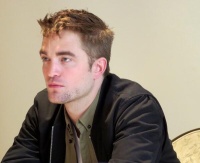


Giles Hardie
RogerEbert
The Insider
THR
Crave online
Collider
Rotten Tomatoes
Nerdist
Coming Soon
FOX 411
rplife by pinupgrrrl
Movie Pilot
rplife by pinupgrrrl
TIME
When making his new film, The Rover, director David Michod may have uncovered the only location on Earth where Robert Pattinson is not followed by a hoard of paparazzi. The poetically sparse film, out nationwide this Friday, takes place in a desolate world 10 years in the future after the collapse of society, and reveals what could happen if humans are forced to survive by any means necessary. To create that world, Michod took Pattinson and his co-star Guy Pearce to the Flinders Ranges in the Australian desert, an area several hours north of Adelaide with few roads and fewer people. The cast and crew spent eight weeks shooting in early 2013, moving around to various locations throughout the desert, including the town of Marree, which has a population of 90.
“I didn’t quite realize how remote a lot of it was going to be,”Pattinson tells TIME. “It’s quite a big paparazzi culture in Australia. So I was expecting more of that. I remember setting up the contract and really thinking ‘If we’re going to be shooting exteriors all the time there’s going to be tons of people around. It’s going to be awful. I’m going to be playing this part and everyone’s going to think I’m weird.’”
“For Rob to shoot in a city like here or London you’re going to have a hundred people following the film set around,” Pearce adds. “Imagine if that’s how your work environment was all the time. So it’s not surprising that Rob thought it was going to be awful. But it wasn’t like that. There was like one person and the crew stopped them. I pity that one photographer that managed to find where we were.”
It was a hot, dusty environment that lent itself to the film’s bleak narrative, which follows a weathered man named Eric (Pearce) who encounters a simpleminded young man named Rey (Pattinson) and uses him to find his stolen car. It’s a minimal premise that showcases the grittiness of this future world, packing a subtle but hefty punch at the end. For the actors, the landscape helped channel the visceral survivalist nature of the story. “You know you’re going to be out there when you read the script and you’re aware of that being an aspect of the whole piece,” Pearce notes. “You almost can hear your own heart beating and you can hear yourself breathing. That feeling of possibly left out there alone is really palpable.”
The production moved from small town to small town over the eight weeks. Pearce, who drove himself the long distances, scored a crack in his car windshield that grew each leg of the journey. Pattinson, who says he was not allowed to drive himself, found the nomadic process fascinating and unlike any of his previous filming experiences.“The driving was incredible because there’s one road,” Pattinson says. “There’s so much wildlife [that has] not quite figured out that there’s a road. Literally every day someone would hit a kangaroo. There was blood all over the cars. It was crazy.”
Michod, who wrote the initial story for The Rover with actor Joel Edgerton back in 2008, selected this as his follow-up to 2010’s Animal Kingdom, his debut feature, largely because it embraced this elemental sense of survival in a hostile place. There is little explanation of what has happened that caused society to crumble in the story, but Michod’s underlying idea feels realistically possible.
“There wasn’t one single, sudden, almost unimaginable event that destroyed everything,” the director explains. “There was just a breakdown that was, in all likelihood, caused by a Western economic collapse probably running in tandem with the effects of extreme environmental degradation. Possibly the kinds of wars that might come as a consequence of peoples and countries fighting over limited resources. My hope is that you would just generally get the sense that things have just broken apart as opposed to exploded.”
Pearce and Pattinson’s characters are our window into this broken world, one with a brutal, animalistic instinct and the other with no real method of self-preservation. Pattinson embodies Rey as a twitchy, awkward migrant worker with a deep Southern accent. Michod sees the character as “not fully comfortable his own skin” and was impressed with Pattinson’s immersion into a role that is so different than his prior work, particularly in the Twilight series.
“I didn’t have any concerns,” Michod says of casting an actor as recognizable as Pattinson. “I don’t think I really had any idea how that baggage might manifest in terms of the film is received. And if anything I really liked the idea of taking someone so recognizable and giving them something wildly different to do. I found it kind of exhilarating watching him demonstrate that he’s actually a really wonderful actor.”
“I had quite an obscure, kind of obtuse, backstory for him,” Pattinson says of Rey. “Part of the whole thing with Rey is that his brother has played all the positions in his life. He doesn’t even really have memories – maybe there are memories of a place but it’s not like he had to put any particular effort in as he was growing up. Everything is blended together. It’s like being an actor – you can’t remember anything.”
The film takes on a meditative literary quality, falling somewhere between The Road and Of Mice and Men, which makes its moments of violence even more jarring. The Rover is the first film where Pattinson has really had to use a gun and he was not entranced by the opportunity. “I’m quite anti-gun, especially for idiots like me,” Pattinson says. “I didn’t like it at all. I don’t like the feeling of it. I get the thrill and the power trip of it but I felt silly as well holding a gun, especially pointing at targets and stuff. It’s just this bang-making machine. After a while it loses its luster.”
“I, too, have a real issue with guns,” Pearce adds. “I think they should be banished off the face of the earth. They’re awful things. There is an incredible thrill and sort of power as soon as you have one in your hands. That understanding of what you’re capable of doing with this thing is off the charts. It’s ridiculous and it’s enticing and it’s awful all at the same time and it just astounds me that so many people own guns in the world.”
Seeing as this possible incarnation of the future involves a lot of weaponry and the ability to commit violent acts, would either actor survive a similar collapse? “I think I’d end up in the opium den flophouse,” Pattinson says, referencing a depressed drug den seen briefly in the film. “Just hanging out like ‘I’m good.’” Pearce agrees, “Yeah, I’d probably end up there as well.”“I didn’t quite realize how remote a lot of it was going to be,”Pattinson tells TIME. “It’s quite a big paparazzi culture in Australia. So I was expecting more of that. I remember setting up the contract and really thinking ‘If we’re going to be shooting exteriors all the time there’s going to be tons of people around. It’s going to be awful. I’m going to be playing this part and everyone’s going to think I’m weird.’”
“For Rob to shoot in a city like here or London you’re going to have a hundred people following the film set around,” Pearce adds. “Imagine if that’s how your work environment was all the time. So it’s not surprising that Rob thought it was going to be awful. But it wasn’t like that. There was like one person and the crew stopped them. I pity that one photographer that managed to find where we were.”
It was a hot, dusty environment that lent itself to the film’s bleak narrative, which follows a weathered man named Eric (Pearce) who encounters a simpleminded young man named Rey (Pattinson) and uses him to find his stolen car. It’s a minimal premise that showcases the grittiness of this future world, packing a subtle but hefty punch at the end. For the actors, the landscape helped channel the visceral survivalist nature of the story. “You know you’re going to be out there when you read the script and you’re aware of that being an aspect of the whole piece,” Pearce notes. “You almost can hear your own heart beating and you can hear yourself breathing. That feeling of possibly left out there alone is really palpable.”
The production moved from small town to small town over the eight weeks. Pearce, who drove himself the long distances, scored a crack in his car windshield that grew each leg of the journey. Pattinson, who says he was not allowed to drive himself, found the nomadic process fascinating and unlike any of his previous filming experiences.“The driving was incredible because there’s one road,” Pattinson says. “There’s so much wildlife [that has] not quite figured out that there’s a road. Literally every day someone would hit a kangaroo. There was blood all over the cars. It was crazy.”
Michod, who wrote the initial story for The Rover with actor Joel Edgerton back in 2008, selected this as his follow-up to 2010’s Animal Kingdom, his debut feature, largely because it embraced this elemental sense of survival in a hostile place. There is little explanation of what has happened that caused society to crumble in the story, but Michod’s underlying idea feels realistically possible.
“There wasn’t one single, sudden, almost unimaginable event that destroyed everything,” the director explains. “There was just a breakdown that was, in all likelihood, caused by a Western economic collapse probably running in tandem with the effects of extreme environmental degradation. Possibly the kinds of wars that might come as a consequence of peoples and countries fighting over limited resources. My hope is that you would just generally get the sense that things have just broken apart as opposed to exploded.”
Pearce and Pattinson’s characters are our window into this broken world, one with a brutal, animalistic instinct and the other with no real method of self-preservation. Pattinson embodies Rey as a twitchy, awkward migrant worker with a deep Southern accent. Michod sees the character as “not fully comfortable his own skin” and was impressed with Pattinson’s immersion into a role that is so different than his prior work, particularly in the Twilight series.
“I didn’t have any concerns,” Michod says of casting an actor as recognizable as Pattinson. “I don’t think I really had any idea how that baggage might manifest in terms of the film is received. And if anything I really liked the idea of taking someone so recognizable and giving them something wildly different to do. I found it kind of exhilarating watching him demonstrate that he’s actually a really wonderful actor.”
“I had quite an obscure, kind of obtuse, backstory for him,” Pattinson says of Rey. “Part of the whole thing with Rey is that his brother has played all the positions in his life. He doesn’t even really have memories – maybe there are memories of a place but it’s not like he had to put any particular effort in as he was growing up. Everything is blended together. It’s like being an actor – you can’t remember anything.”
The film takes on a meditative literary quality, falling somewhere between The Road and Of Mice and Men, which makes its moments of violence even more jarring. The Rover is the first film where Pattinson has really had to use a gun and he was not entranced by the opportunity. “I’m quite anti-gun, especially for idiots like me,” Pattinson says. “I didn’t like it at all. I don’t like the feeling of it. I get the thrill and the power trip of it but I felt silly as well holding a gun, especially pointing at targets and stuff. It’s just this bang-making machine. After a while it loses its luster.”
“I, too, have a real issue with guns,” Pearce adds. “I think they should be banished off the face of the earth. They’re awful things. There is an incredible thrill and sort of power as soon as you have one in your hands. That understanding of what you’re capable of doing with this thing is off the charts. It’s ridiculous and it’s enticing and it’s awful all at the same time and it just astounds me that so many people own guns in the world.”
THE TELEGRAPH UK
He has millions of female fans, he lives in Los Angeles and paparazzi dog his footsteps wherever he goes; yet it would be difficult to find a young man less interested in embracing his stardom than Robert Pattinson. The 28-year-old actor refuses to go the Hollywood route of big houses, wardrobes full of designer clothes and roles that utilise his boyish good looks.
He has even rejected the idea of taking the near-obligatory therapy route followed by nearly every self-absorbed star in Hollywood, although he jokes: “I would love to go into therapy but it makes me too anxious.”
Then, more seriously, he adds: “I’ve been talking to a lot of people about it and I don’t know. I kind of like my anxiety in a funny sort of way and I like my peaks and troughs. Luckily depression never lasts long with me.”
We are talking in a Beverly Hills hotel suite about his new film The Rover, set in a post-apocalyptic Australian wasteland, in which he is totally unrecognisable as Rey, a twitchy, dirt-caked, slow-witted lost soul with rotting teeth. He joins forces with Eric (Guy Pearce), a man of few words who is on the trail of a gang of thieves who stole his only possession, his car. Rey is a role as far removed from the handsome Edward Cullen in the Twilight movies as Pattinson could get – which suits him fine.
For three years, Pattinson lived virtually non-stop with the adventures of the brooding vampire and his romance with the mortal schoolgirl Bella, played by Kristen Stewart. It was the role that, whether he likes it or not, made him one of the hottest and most in-demand young actors in the world. He caused an army of female fans to leave their families and homes to follow him to wherever he was filming.
“I had a bit of a struggle at first because my life really contracted and I couldn’t do a lot of the stuff I used to be able to do," he admits. "But once I got through that a year or two ago I just accepted my life is something else and now I can’t really remember what it was like before, So it’s much easier to deal with.
“It seems much longer ago than two years since the last Twilight came out and I think as you get older you get a bit more confident with every movie you do, so it’s been a gradual graduation to this.”
Pattinson's "graduation" has included a romantic melodrama (Remember Me), a period circus piece (Water for Elephants), a tale of the French nobility (Bel Ami) and playing an introspective Wall Street tycoon (Cosmopolis). He will soon be seen as T.E. Lawrence in the yet-to-be-released Nicole Kidman film Queen of the Desert and he is a wannabe actor and writer in David Cronenberg's Maps to the Stars which, like The Rover, was well-received at this year's Cannes Film Festival.
“I’m curious to know whether people who liked the Twilight movies will come and see things like The Rover,” he says. “Hopefully they’ll enjoy it. I try to do ambitious projects but I don’t know if people are going to like them. You just try and do things which are challenging and hopefully people will appreciate that.”
Although his name is regularly linked with big studio projects such as Star Wars and superhero movies (recent rumours had him cast as a young Han Solo in a Star Wars spin-off), he denies he has ever been offered them and is wary about becoming involved in another franchise. “They don’t come into my orbit and I don’t really see myself in a lot of mainstream parts,” he says. “I’ve never been part of the group that gets these roles.”
He particularly enjoyed working on the low-budget apocalyptic thriller The Rover because it was filmed entirely on location in the scorching heat of the Australian outback, where he existed on a diet of “white bread and barbecue sauce”, and where there were no fans or photographers to pester him. “I just loved it because not only was there no one trying to find you, there’s no one there at all. I wasn’t worrying about anyone trying to sneak up on me or anything so I found it incredibly peaceful and relaxing.”
To land the role he had to go through an arduous four-hour audition for writer-director David Michod, whose previous film was the well-reviewed Animal Kingdom. “For the first 45 minutes I had to deal with my own neuroses before I’d do any kind of acting and I think David recognised this and when I let myself calm down I was fine.”
Michod recalls: “We would do a take and Robert would go, ‘Oh I was so terrible.’ But he wasn’t terrible, he’s just very English and very self-deprecating. I knew within five minutes of our four hour audition I’d found the actor to play Rey.”
Pattinson’s global travels keep him away from his home in London, which he isn’t too sorry about. “I spent two months in England last year which is the longest I’ve spent there in six years, which was nice, but I always go back to England at Christmas time and get so depressed that I’m glad to get back to Los Angeles," he says. "I’ve really grown to like L.A and I guess it’s my home at the moment.”
His current home is other people’s houses. “I had this great house which I bought four or five years ago," he says. "It was incredible, absolutely completely crazy. It was like Versailles, with an incredible garden, but I just stayed in one room. I sold it because I suddenly realised I’m not quite old enough to be dealing with plumbing and stuff. So I spent about six months borrowing peoples’ houses, which was nice. Now I’m renting a place which is much smaller.”
Pattinson laughs easily and often and is much more relaxed and at ease than in the early days when he resembled a startled deer caught in the headlights. Despite the massive changes in his life in a relatively short time, he has kept his feet firmly on the ground. Although he appears in advertisements for Christian Dior, he is certainly no fashion plate; he lost nearly all his clothes following a recent house move and hasn't bothered to replace them. “I’ve started wearing the same thing pretty much every day like a uniform,” he says. “I haven’t taken this jacket off for weeks,” indicating the black, slightly moth-eaten jacket he is wearing that nevertheless looks good on him.
“It’s ridiculous. I don’t understand how I don’t have any clothes. I’ve basically stolen every item of clothing that anyone’s ever given me for a premiere but in my closet there are literally about three things. I’m sure there’s some kind of random storage box full of them somewhere.”
Working for Dior, he says with a chuckle, is “the most ridiculous job in the world. I have to do barely anything and I just occasionally have to go to some Dior parties, which is great.”
Pattinson was born in Barnes, West London, and joined the local theatre club as a teenager. He was spotted by a casting agent and made his screen debut in 2004 in a German television production; he was then bizarrely cast as Reese Witherspoon’s son in Vanity Fair, although his scenes ended up on the cutting room floor.
He achieved some recognition for his role as the brave but doomed Cedric Diggory in Harry Potter and the Goblet of Fire and he had a brief flashback cameo in Harry Potter and the Order of the Phoenix. He had been torn between an acting career and going to university but the Harry Potter roles convinced him to stick with acting. He played a shell-shocked Second World War airman in a BBC Four production, The Haunted Airman, but then spent the best part of the next two years unemployed. His agent persuaded him to try his luck in Los Angeles so, armed with little but an English accent and a sense of humour, he did.
He was not sure whether he wanted the Twilight role when he was first offered it after auditioning by performing a love scene with the already-cast Kristen Stewart; she persuaded the director, Catherine Hardwicke, that he was the actor to play the troubled vampire Edward Cullen. “I’d read the book and couldn’t really picture myself in the role of this handsome, perfect guy,” he says. “I didn’t know how big it was going to be."
He was romantically involved with his co-star Stewart for three years but the romance ended when she reportedly had an affair with her Snow White and the Huntsman director Rupert Sanders. He is currently dating model Imogen Kerr although he politely declines to talk about his romantic life.
Reviewing how he arrived at where he is in life he uses a word which features frequently in his vocabulary –“ridiculous".
"I’m extremely lucky which always makes me a little nervous,” he says. “I don’t quite know why I got so lucky but yeah, it’s just ridiculous and I’m pretty happy. Yeah, definitely pretty happy.”
The Rover is released on August 15 (UK)
He has even rejected the idea of taking the near-obligatory therapy route followed by nearly every self-absorbed star in Hollywood, although he jokes: “I would love to go into therapy but it makes me too anxious.”
Then, more seriously, he adds: “I’ve been talking to a lot of people about it and I don’t know. I kind of like my anxiety in a funny sort of way and I like my peaks and troughs. Luckily depression never lasts long with me.”
We are talking in a Beverly Hills hotel suite about his new film The Rover, set in a post-apocalyptic Australian wasteland, in which he is totally unrecognisable as Rey, a twitchy, dirt-caked, slow-witted lost soul with rotting teeth. He joins forces with Eric (Guy Pearce), a man of few words who is on the trail of a gang of thieves who stole his only possession, his car. Rey is a role as far removed from the handsome Edward Cullen in the Twilight movies as Pattinson could get – which suits him fine.
For three years, Pattinson lived virtually non-stop with the adventures of the brooding vampire and his romance with the mortal schoolgirl Bella, played by Kristen Stewart. It was the role that, whether he likes it or not, made him one of the hottest and most in-demand young actors in the world. He caused an army of female fans to leave their families and homes to follow him to wherever he was filming.
“I had a bit of a struggle at first because my life really contracted and I couldn’t do a lot of the stuff I used to be able to do," he admits. "But once I got through that a year or two ago I just accepted my life is something else and now I can’t really remember what it was like before, So it’s much easier to deal with.
“It seems much longer ago than two years since the last Twilight came out and I think as you get older you get a bit more confident with every movie you do, so it’s been a gradual graduation to this.”
Pattinson's "graduation" has included a romantic melodrama (Remember Me), a period circus piece (Water for Elephants), a tale of the French nobility (Bel Ami) and playing an introspective Wall Street tycoon (Cosmopolis). He will soon be seen as T.E. Lawrence in the yet-to-be-released Nicole Kidman film Queen of the Desert and he is a wannabe actor and writer in David Cronenberg's Maps to the Stars which, like The Rover, was well-received at this year's Cannes Film Festival.
“I’m curious to know whether people who liked the Twilight movies will come and see things like The Rover,” he says. “Hopefully they’ll enjoy it. I try to do ambitious projects but I don’t know if people are going to like them. You just try and do things which are challenging and hopefully people will appreciate that.”
Although his name is regularly linked with big studio projects such as Star Wars and superhero movies (recent rumours had him cast as a young Han Solo in a Star Wars spin-off), he denies he has ever been offered them and is wary about becoming involved in another franchise. “They don’t come into my orbit and I don’t really see myself in a lot of mainstream parts,” he says. “I’ve never been part of the group that gets these roles.”
He particularly enjoyed working on the low-budget apocalyptic thriller The Rover because it was filmed entirely on location in the scorching heat of the Australian outback, where he existed on a diet of “white bread and barbecue sauce”, and where there were no fans or photographers to pester him. “I just loved it because not only was there no one trying to find you, there’s no one there at all. I wasn’t worrying about anyone trying to sneak up on me or anything so I found it incredibly peaceful and relaxing.”
To land the role he had to go through an arduous four-hour audition for writer-director David Michod, whose previous film was the well-reviewed Animal Kingdom. “For the first 45 minutes I had to deal with my own neuroses before I’d do any kind of acting and I think David recognised this and when I let myself calm down I was fine.”
Michod recalls: “We would do a take and Robert would go, ‘Oh I was so terrible.’ But he wasn’t terrible, he’s just very English and very self-deprecating. I knew within five minutes of our four hour audition I’d found the actor to play Rey.”
Pattinson’s global travels keep him away from his home in London, which he isn’t too sorry about. “I spent two months in England last year which is the longest I’ve spent there in six years, which was nice, but I always go back to England at Christmas time and get so depressed that I’m glad to get back to Los Angeles," he says. "I’ve really grown to like L.A and I guess it’s my home at the moment.”
His current home is other people’s houses. “I had this great house which I bought four or five years ago," he says. "It was incredible, absolutely completely crazy. It was like Versailles, with an incredible garden, but I just stayed in one room. I sold it because I suddenly realised I’m not quite old enough to be dealing with plumbing and stuff. So I spent about six months borrowing peoples’ houses, which was nice. Now I’m renting a place which is much smaller.”
Pattinson laughs easily and often and is much more relaxed and at ease than in the early days when he resembled a startled deer caught in the headlights. Despite the massive changes in his life in a relatively short time, he has kept his feet firmly on the ground. Although he appears in advertisements for Christian Dior, he is certainly no fashion plate; he lost nearly all his clothes following a recent house move and hasn't bothered to replace them. “I’ve started wearing the same thing pretty much every day like a uniform,” he says. “I haven’t taken this jacket off for weeks,” indicating the black, slightly moth-eaten jacket he is wearing that nevertheless looks good on him.
“It’s ridiculous. I don’t understand how I don’t have any clothes. I’ve basically stolen every item of clothing that anyone’s ever given me for a premiere but in my closet there are literally about three things. I’m sure there’s some kind of random storage box full of them somewhere.”
Working for Dior, he says with a chuckle, is “the most ridiculous job in the world. I have to do barely anything and I just occasionally have to go to some Dior parties, which is great.”
Pattinson was born in Barnes, West London, and joined the local theatre club as a teenager. He was spotted by a casting agent and made his screen debut in 2004 in a German television production; he was then bizarrely cast as Reese Witherspoon’s son in Vanity Fair, although his scenes ended up on the cutting room floor.
He achieved some recognition for his role as the brave but doomed Cedric Diggory in Harry Potter and the Goblet of Fire and he had a brief flashback cameo in Harry Potter and the Order of the Phoenix. He had been torn between an acting career and going to university but the Harry Potter roles convinced him to stick with acting. He played a shell-shocked Second World War airman in a BBC Four production, The Haunted Airman, but then spent the best part of the next two years unemployed. His agent persuaded him to try his luck in Los Angeles so, armed with little but an English accent and a sense of humour, he did.
He was not sure whether he wanted the Twilight role when he was first offered it after auditioning by performing a love scene with the already-cast Kristen Stewart; she persuaded the director, Catherine Hardwicke, that he was the actor to play the troubled vampire Edward Cullen. “I’d read the book and couldn’t really picture myself in the role of this handsome, perfect guy,” he says. “I didn’t know how big it was going to be."
He was romantically involved with his co-star Stewart for three years but the romance ended when she reportedly had an affair with her Snow White and the Huntsman director Rupert Sanders. He is currently dating model Imogen Kerr although he politely declines to talk about his romantic life.
Reviewing how he arrived at where he is in life he uses a word which features frequently in his vocabulary –“ridiculous".
"I’m extremely lucky which always makes me a little nervous,” he says. “I don’t quite know why I got so lucky but yeah, it’s just ridiculous and I’m pretty happy. Yeah, definitely pretty happy.”
The Rover is released on August 15 (UK)
THE BOSTON GLOBE
Robert Pattinson is a changed man, literally, in David Michôd’s latest drama, “The Rover.” Gone are his perfect “Twilight” teeth and the floppy hair that helped the teen vampire franchise make billions at the box office. Gone is the brooding, leading-man stare that made its way into “Water for Elephants” and gave star power to David Cronenberg’s adaptation of Don DeLillo’s bleak “Cosmopolis.”
In “The Rover,” the post-apocalyptic tale of a man (Guy Pearce) on a desperate search for his car in the desolate Australian outback, Pattinson plays a troubled sidekick — a slow-thinking man with a Southern drawl, rotting teeth, and a violent streak.
The role, which adds moments of strange comic relief to the film, won Pattinson big accolades at the Cannes Film Festival. The actor, 28 and almost two years past “The Twilight Saga,” called the Globe to talk about “The Rover” hours before it had its Los Angeles premiere.
Q. I spent the day reading reviews of you in this movie. They use phrases like “inarguable skill.”
A. Wow.
Q. Do you read reviews?
A. Oh, yeah, definitely, but I only remember the bad ones.
Q. Have you always read reviews? Even during the “Twilight” years?
A. I never learn my lesson. I was sitting around earlier reading them and everyone’s like, “Stop it. You’ve got to keep doing press all day.”
Q. You must be loving all these “Rover” reviews. People keep using the word “transformative.”
A. It’s really the best I could have hoped to have happened. I’d already come to terms with it being completely not received well and everyone hating it, so everything is a bonus.
Q. How did you wind up in this film? I read an interview with your director [Michôd] where he talked about having a meeting with you. I was wondering which one of you was wooing the other.
A. I met him before the script was even around. I loved “Animal Kingdom” so much. I like quite aggressive filmmaking. He seems very ambitious, which is very different. When this script came around, it was one of the top five scripts I’ve ever read since I started acting.
Q. At what point was it decided that you were going to do a deep Southern accent in this film?
A. It said in the tiny description of the character that he was from the South, and that was basically the only thing it said about the character. Actually, Southern accents are quite fun to do anyway; you want to start saying the lines out loud. Generally, you want to start being analytical about a part, and with this, it was just immediately — you want to perform it.
Q. The accent seemed effortless.
A. For some reason, with regional and American accents, my ear’s quite good, it’s quite attuned to it. I can do regional American a lot better than I can do regional English. I don’t know why. I think just growing up on American movies — and from singing as well. I grew up listening to a lot of blues and stuff. It’s that kind of cadence.
Q. I want to talk about the wardrobe in this film – and the teeth. You looked believably filthy.
A. It’s massive to me, all the costumes and everything, especially shoes and stuff. However generic the wardrobe looks, like the jeans, we’d gone through hundreds of pairs of five-dollar jeans to find the right ones.
Q. Were you allowed to shower during this filming process?
A. Yeah, it doesn’t make any difference. The second you wake up in the morning, you’re already pouring sweat. [“The Rover” was shot in Australia.] It’s kind of nice because you don’t need to have the makeup touch-up every two seconds. You’re just covered in blood and grime.
Q. I wondered which was more difficult — to be in this kind of costume or to be in “Cosmopolis,” where you have to look perfect throughout the film.
A. I guess both of them. I remember waking up [during the shooting of] “Cosmopolis,” and my hair was stuck in the shape constantly. This [“Rover” look] is nice because you can sit around in a big pile of mud and just enjoy yourself.
Q. Speaking of “Cosmopolis,” David Cronenberg is being honored at the Provincetown Film Festival this weekend. You’ve now worked with him twice, in “Cosmopolis” and “Maps to the Stars.” If I get to interview him, what should I ask?
A. I would try to find the most random question about African politics or something and he’ll stun you with his encyclopedic knowledge of it. Or about 15th-century Czechoslovakian philosophy. He’ll be like, “Oh, as a matter of fact . . . ”
Q. According to the Internet, you’re in the running to play Indiana Jones. Is that just a Hollywood rumor or the real thing?
A. No, I think this story’s just made up. It’s like a, what is it called, a reverse psychology sound board where they say, “Oh, let’s write an article about how excited we are about him being cast as Indiana Jones and then everyone will say how much they hate him and how terrible an idea it is.”
Q. You have your big “Rover” premiere tonight. Will your “Twilight” fans still camp out to see you?
A. They’ve always been pretty supportive in every movie I’ve done; they’ve always created websites for the movie and stuff. I think everyone I work with is so stunned because they’re very proactive. That’s kind of great and always kind of shocking. Yeah, I’m curious about how people are going to interpret this one.
Q. You talk about liking ambitious directors. What’s the next ambitious move for you?
A. I just keep getting really lucky. I’m doing [“Idol’s Eye”] in October with [French director] Olivier Assayas and Robert De Niro, which is kind of a ridiculous thing. I met Olivier two years ago and he talked about this script. It’s crazy and I’m so excited about doing it. Things just seem to keep dropping in my lap at the perfect moment.
Q. Do you get any chance to read books — or is it all scripts now?
A. I just read the Andre Agassi autobiography, which I thought was amazing. I thought it was so great. I read this book by Steven Pinker called “How the Mind Works,” which is also one of the best books I’ve read in ages. It’s about evolutionary psychology. I didn’t understand any of it [laughing].
Q. I should ask what you’re wearing to the premiere tonight. Isn’t that what I’m supposed to ask?
A. Really, I’m actually staring right at it right now because I had to get it refitted because I’m a fatass at the moment. I think it’s Alexander McQueen.
In “The Rover,” the post-apocalyptic tale of a man (Guy Pearce) on a desperate search for his car in the desolate Australian outback, Pattinson plays a troubled sidekick — a slow-thinking man with a Southern drawl, rotting teeth, and a violent streak.
The role, which adds moments of strange comic relief to the film, won Pattinson big accolades at the Cannes Film Festival. The actor, 28 and almost two years past “The Twilight Saga,” called the Globe to talk about “The Rover” hours before it had its Los Angeles premiere.
Q. I spent the day reading reviews of you in this movie. They use phrases like “inarguable skill.”
A. Wow.
Q. Do you read reviews?
A. Oh, yeah, definitely, but I only remember the bad ones.
Q. Have you always read reviews? Even during the “Twilight” years?
A. I never learn my lesson. I was sitting around earlier reading them and everyone’s like, “Stop it. You’ve got to keep doing press all day.”
Q. You must be loving all these “Rover” reviews. People keep using the word “transformative.”
A. It’s really the best I could have hoped to have happened. I’d already come to terms with it being completely not received well and everyone hating it, so everything is a bonus.
Q. How did you wind up in this film? I read an interview with your director [Michôd] where he talked about having a meeting with you. I was wondering which one of you was wooing the other.
A. I met him before the script was even around. I loved “Animal Kingdom” so much. I like quite aggressive filmmaking. He seems very ambitious, which is very different. When this script came around, it was one of the top five scripts I’ve ever read since I started acting.
Q. At what point was it decided that you were going to do a deep Southern accent in this film?
A. It said in the tiny description of the character that he was from the South, and that was basically the only thing it said about the character. Actually, Southern accents are quite fun to do anyway; you want to start saying the lines out loud. Generally, you want to start being analytical about a part, and with this, it was just immediately — you want to perform it.
Q. The accent seemed effortless.
A. For some reason, with regional and American accents, my ear’s quite good, it’s quite attuned to it. I can do regional American a lot better than I can do regional English. I don’t know why. I think just growing up on American movies — and from singing as well. I grew up listening to a lot of blues and stuff. It’s that kind of cadence.
Q. I want to talk about the wardrobe in this film – and the teeth. You looked believably filthy.
A. It’s massive to me, all the costumes and everything, especially shoes and stuff. However generic the wardrobe looks, like the jeans, we’d gone through hundreds of pairs of five-dollar jeans to find the right ones.
Q. Were you allowed to shower during this filming process?
A. Yeah, it doesn’t make any difference. The second you wake up in the morning, you’re already pouring sweat. [“The Rover” was shot in Australia.] It’s kind of nice because you don’t need to have the makeup touch-up every two seconds. You’re just covered in blood and grime.
Q. I wondered which was more difficult — to be in this kind of costume or to be in “Cosmopolis,” where you have to look perfect throughout the film.
A. I guess both of them. I remember waking up [during the shooting of] “Cosmopolis,” and my hair was stuck in the shape constantly. This [“Rover” look] is nice because you can sit around in a big pile of mud and just enjoy yourself.
Q. Speaking of “Cosmopolis,” David Cronenberg is being honored at the Provincetown Film Festival this weekend. You’ve now worked with him twice, in “Cosmopolis” and “Maps to the Stars.” If I get to interview him, what should I ask?
A. I would try to find the most random question about African politics or something and he’ll stun you with his encyclopedic knowledge of it. Or about 15th-century Czechoslovakian philosophy. He’ll be like, “Oh, as a matter of fact . . . ”
Q. According to the Internet, you’re in the running to play Indiana Jones. Is that just a Hollywood rumor or the real thing?
A. No, I think this story’s just made up. It’s like a, what is it called, a reverse psychology sound board where they say, “Oh, let’s write an article about how excited we are about him being cast as Indiana Jones and then everyone will say how much they hate him and how terrible an idea it is.”
Q. You have your big “Rover” premiere tonight. Will your “Twilight” fans still camp out to see you?
A. They’ve always been pretty supportive in every movie I’ve done; they’ve always created websites for the movie and stuff. I think everyone I work with is so stunned because they’re very proactive. That’s kind of great and always kind of shocking. Yeah, I’m curious about how people are going to interpret this one.
Q. You talk about liking ambitious directors. What’s the next ambitious move for you?
A. I just keep getting really lucky. I’m doing [“Idol’s Eye”] in October with [French director] Olivier Assayas and Robert De Niro, which is kind of a ridiculous thing. I met Olivier two years ago and he talked about this script. It’s crazy and I’m so excited about doing it. Things just seem to keep dropping in my lap at the perfect moment.
Q. Do you get any chance to read books — or is it all scripts now?
A. I just read the Andre Agassi autobiography, which I thought was amazing. I thought it was so great. I read this book by Steven Pinker called “How the Mind Works,” which is also one of the best books I’ve read in ages. It’s about evolutionary psychology. I didn’t understand any of it [laughing].
Q. I should ask what you’re wearing to the premiere tonight. Isn’t that what I’m supposed to ask?
A. Really, I’m actually staring right at it right now because I had to get it refitted because I’m a fatass at the moment. I think it’s Alexander McQueen.
Star Tribune
Young-adult blockbusters deal in uncomplicated emotions that make them a poor actors’ showcase. Robert Pattinson’s career-launching five-year tour on the “Twilight” series gave him worldwide stardom and wealth, but not the thing he wanted most: respectability.
Even before the “Twilight” series concluded, Pattinson was stretching his range in smaller films. He played the 18-year-old but fully eccentric Salvador Dali in the Spanish-British gay love drama “Little Ashes,” and a scandal-mongering Parisian journalist in “Bel Ami.” He also took romantic leading roles in Hollywood’s “Remember Me” and “Water for Elephants,” but his mind was on more ambitious fare.
Which is why he’s starring as a grubby, violent, mental defective in the Australian suspense thriller “The Rover.” It’s an in-your-face change of pace that puts the British-born actor alongside the intense Guy Pearce. The pair play reluctant allies chasing cutthroats across the desolate Outback. Pattinson has won the best reviews of his career as a fidgeting misfit with a stuttering Florida twang.
The film was shot literally at the end of the road, he explained in a recent phone conversation. “It was where the tarmac ended. Then it was dirt road for another 2,000 miles to the other end of Australia.” The main location, a squalid village, has a population of “40 or 50, in the middle of nowhere.”
Though the conditions were rough, “there’s something really fun about having everyone together,” he said. “There’s a holiday element of it, as well. I enjoyed it.” But it wasn’t the stripped-down production that appealed as much as the lightly written role, offering wide latitude for a performer to make it his own. The screenplay is by director David Michôd and Joel Edgerton, both of whom are also actors.
“There’s something so special in the dialogue,” so terse it makes David Mamet sound gabby. “There’s just these two dialogue scenes that reveal things in an obtuse way about the character in the midst of these massive silences. I knew I’d have to bring tons to the table.”
“I thought it was funny when I first read it,” Pattinson said. Still, his audition meeting with the filmmakers was an endurance test. “I’m not the kind of actor who can just walk in and hang it out immediately. There’s just like a whole bunch of different neuroses I have to deal with first,” he said with a laugh. “The audition was like four hours long. The first 30 minutes I was in total panic mode, not able to really do anything. As soon as we got through that initial barrier, it was a lot easier. David definitely understands that.”
Pattinson had lots of leeway in creating his character’s stumbling speech patterns and desert derelict look. His hair is buzzed short and cropped high in the back, revealing a length of neck that looks vulnerable and ax-ready. “I liked the idea of seeing that bone at the bottom of your skull,” he said. I realized that when you’ve just got a fuzzy hairball, like a Q-Tip head, and you’re doing an over-the-shoulder shot, you can see the tendons in the back of your neck and stuff. You can still kind of do things, even when the camera’s not on your face. You’re still part of the scene.”
Alongside “The Rover’s” premiere at Cannes, Pattinson also presented his second collaboration with David Cronenberg, the blistering film-industry satire “Maps to the Stars.” If that nose-thumbing bruises any egos in the movie establishment, it won’t slow Pattinson’s indie-oriented momentum a bit. He has projects lined up with Harmony Korine (“Spring Breakers”), James Gray (“The Immigrant”) and Werner Herzog, whose “Rescue Dawn” gave Christian Bale a change of pace from his run as Batman.
Even before the “Twilight” series concluded, Pattinson was stretching his range in smaller films. He played the 18-year-old but fully eccentric Salvador Dali in the Spanish-British gay love drama “Little Ashes,” and a scandal-mongering Parisian journalist in “Bel Ami.” He also took romantic leading roles in Hollywood’s “Remember Me” and “Water for Elephants,” but his mind was on more ambitious fare.
Which is why he’s starring as a grubby, violent, mental defective in the Australian suspense thriller “The Rover.” It’s an in-your-face change of pace that puts the British-born actor alongside the intense Guy Pearce. The pair play reluctant allies chasing cutthroats across the desolate Outback. Pattinson has won the best reviews of his career as a fidgeting misfit with a stuttering Florida twang.
The film was shot literally at the end of the road, he explained in a recent phone conversation. “It was where the tarmac ended. Then it was dirt road for another 2,000 miles to the other end of Australia.” The main location, a squalid village, has a population of “40 or 50, in the middle of nowhere.”
Though the conditions were rough, “there’s something really fun about having everyone together,” he said. “There’s a holiday element of it, as well. I enjoyed it.” But it wasn’t the stripped-down production that appealed as much as the lightly written role, offering wide latitude for a performer to make it his own. The screenplay is by director David Michôd and Joel Edgerton, both of whom are also actors.
“There’s something so special in the dialogue,” so terse it makes David Mamet sound gabby. “There’s just these two dialogue scenes that reveal things in an obtuse way about the character in the midst of these massive silences. I knew I’d have to bring tons to the table.”
“I thought it was funny when I first read it,” Pattinson said. Still, his audition meeting with the filmmakers was an endurance test. “I’m not the kind of actor who can just walk in and hang it out immediately. There’s just like a whole bunch of different neuroses I have to deal with first,” he said with a laugh. “The audition was like four hours long. The first 30 minutes I was in total panic mode, not able to really do anything. As soon as we got through that initial barrier, it was a lot easier. David definitely understands that.”
Pattinson had lots of leeway in creating his character’s stumbling speech patterns and desert derelict look. His hair is buzzed short and cropped high in the back, revealing a length of neck that looks vulnerable and ax-ready. “I liked the idea of seeing that bone at the bottom of your skull,” he said. I realized that when you’ve just got a fuzzy hairball, like a Q-Tip head, and you’re doing an over-the-shoulder shot, you can see the tendons in the back of your neck and stuff. You can still kind of do things, even when the camera’s not on your face. You’re still part of the scene.”
Alongside “The Rover’s” premiere at Cannes, Pattinson also presented his second collaboration with David Cronenberg, the blistering film-industry satire “Maps to the Stars.” If that nose-thumbing bruises any egos in the movie establishment, it won’t slow Pattinson’s indie-oriented momentum a bit. He has projects lined up with Harmony Korine (“Spring Breakers”), James Gray (“The Immigrant”) and Werner Herzog, whose “Rescue Dawn” gave Christian Bale a change of pace from his run as Batman.
VH1

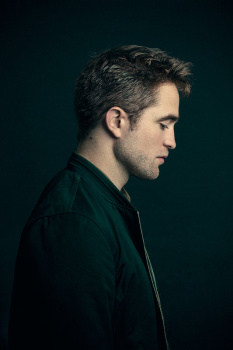


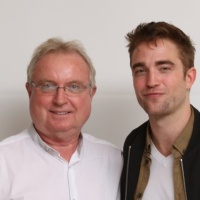
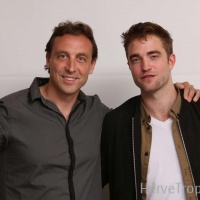
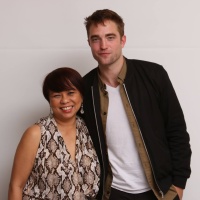


.jpg)
No comments:
Post a Comment